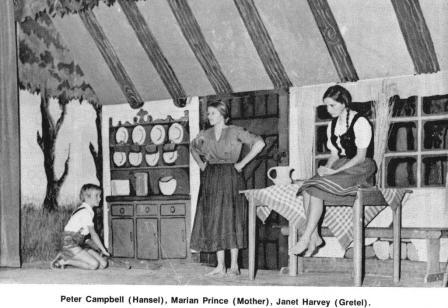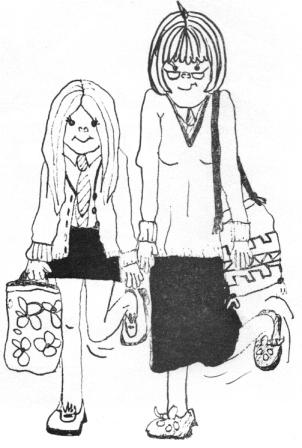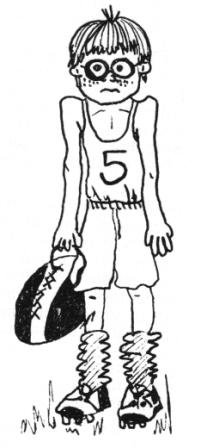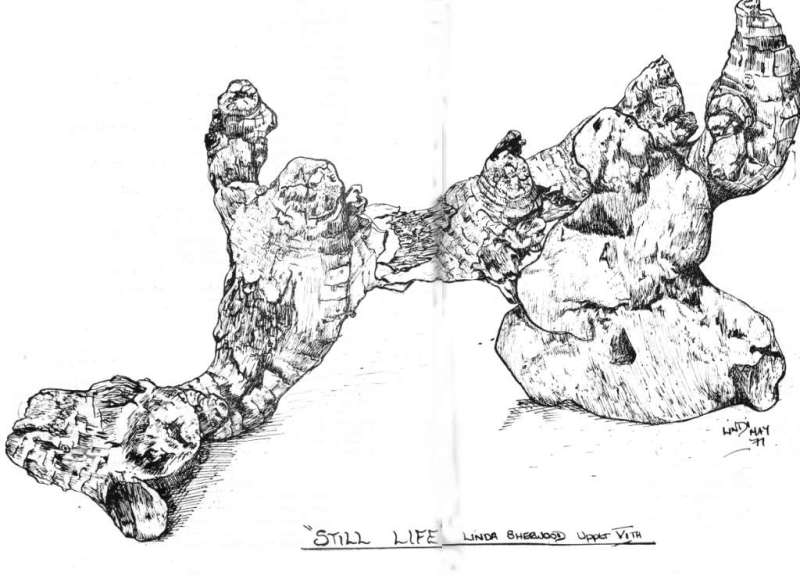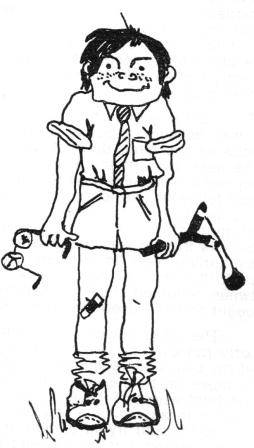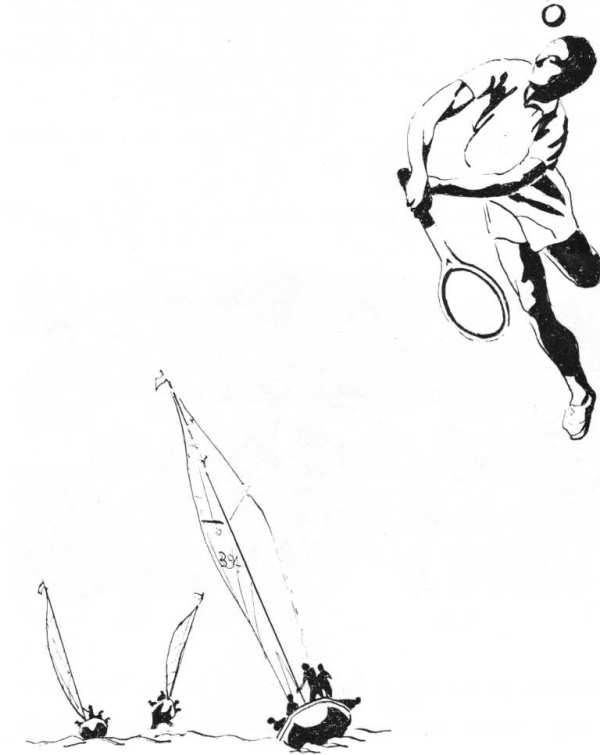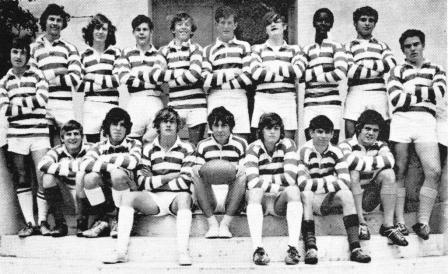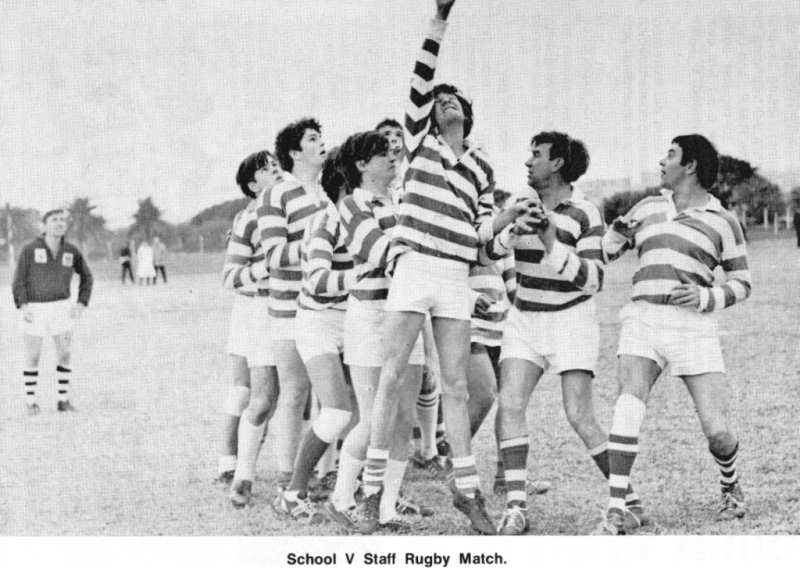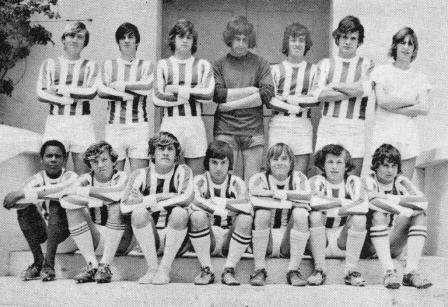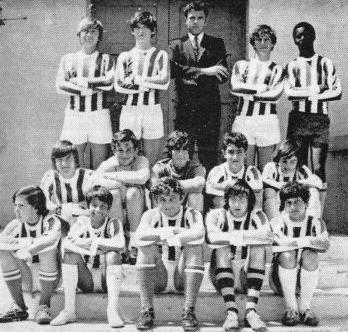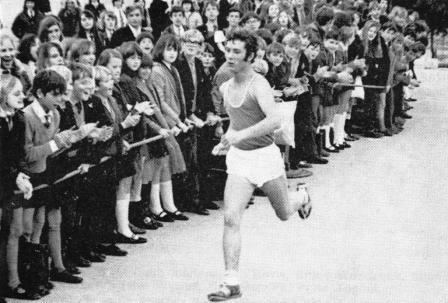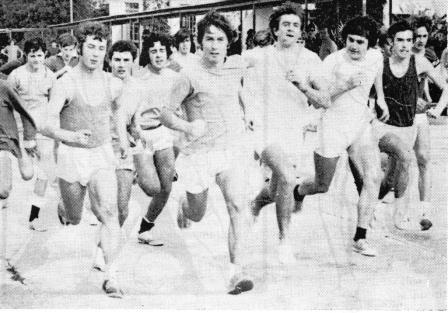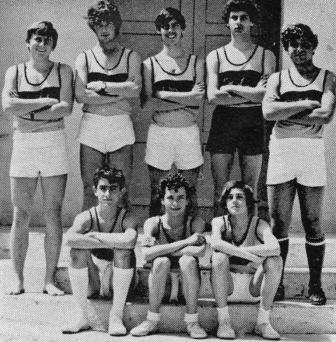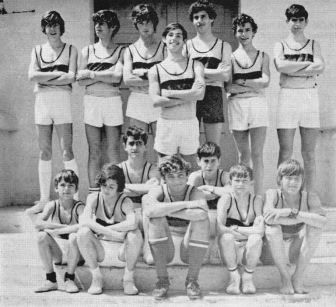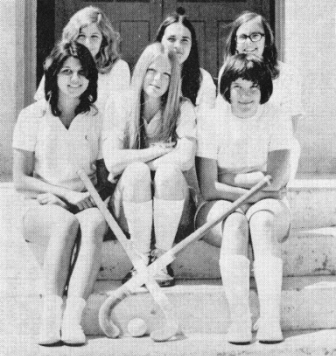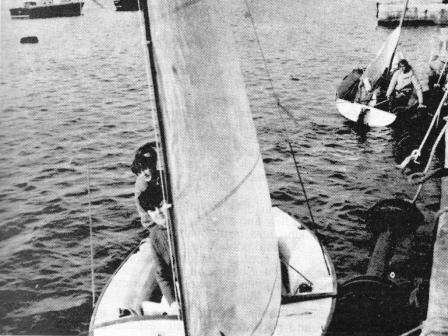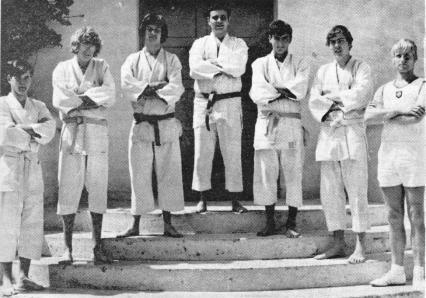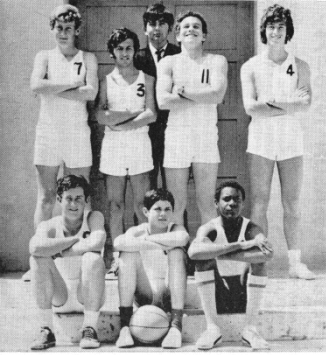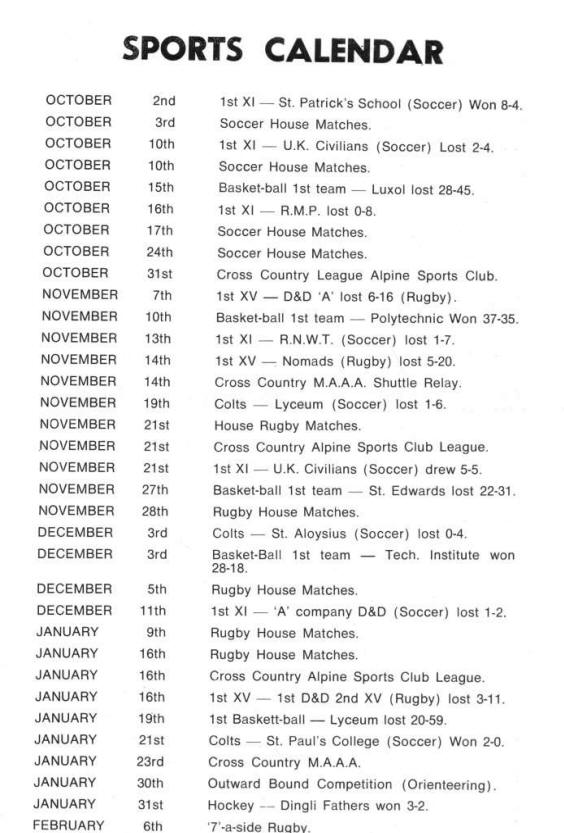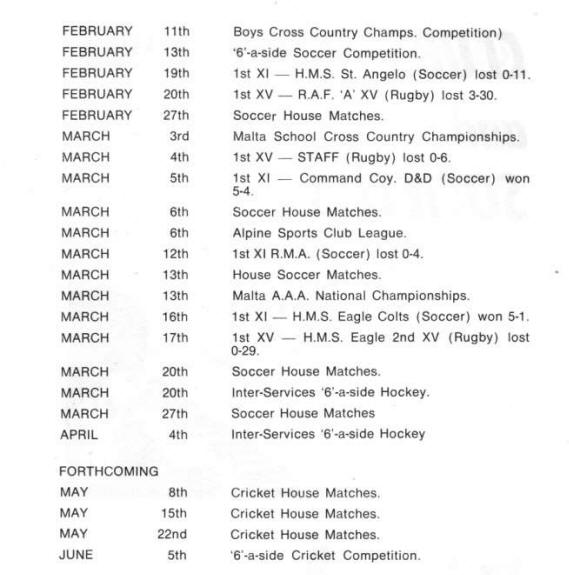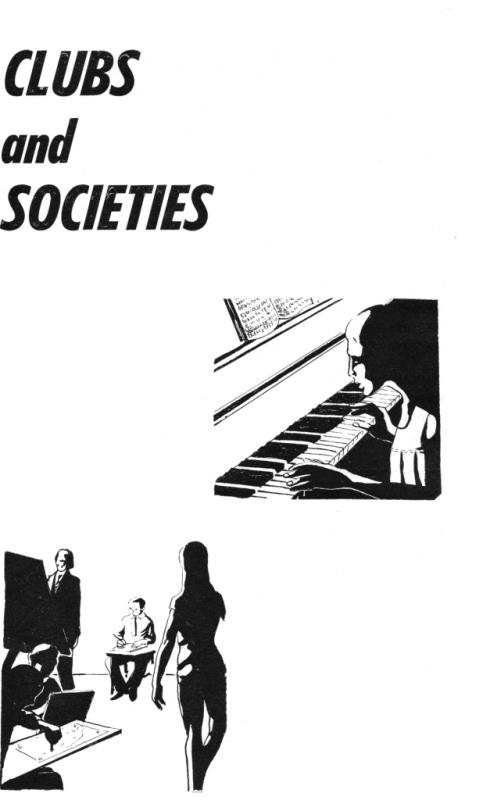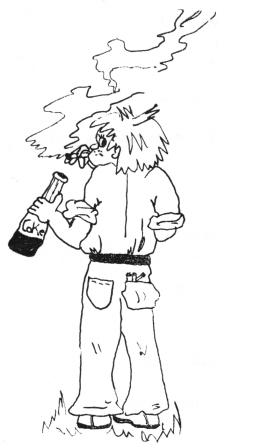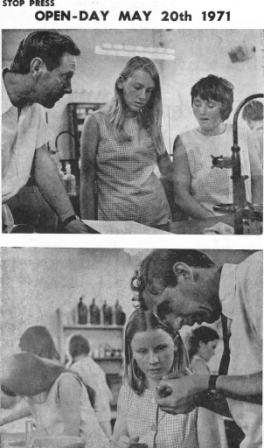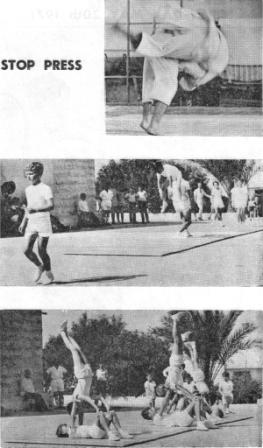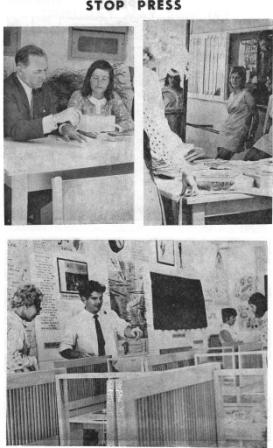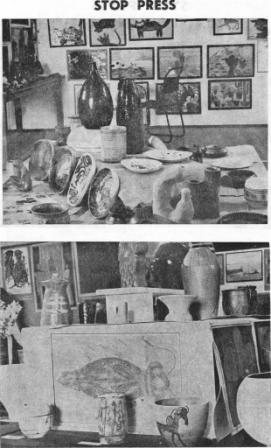Tal Ħandaq Magazine 1971 contributed by Spencer Berry
![]()
![]()
![]() Sports
Section
House Reports Best Article
Sports
Section
House Reports Best Article
|
TAL-HANDAQ SCHOOL 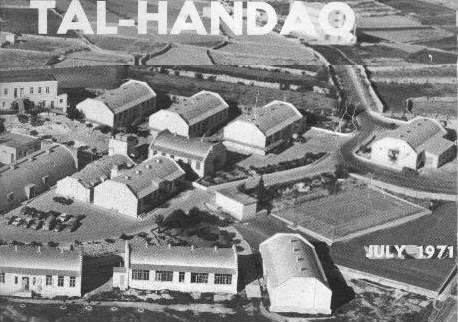
MALTA G.C JULY 1971
CONTENTS Page TAL-HANDAQ SCHOOL STAFF............................................... 3 HEADMASTER'S NOTES.............................................................. 4 ARRIVALS AND DEPARTURES ...................................... 5 CALENDAR OF EVENTS.............................................................. 7 HANSEL AND GRETEL ............................................................ 8 CHARITIES....................................................................................... 10 SCHOOL DANCE ..................................................................... 11 ANNUAL PRIZE-GIVING......................................................... 12 EXAMINATION RESULTS........................................................ 18 POEMS AND ESSAYS ......................................................... 24 SCHOOL SPORTS REPORTS................................................... 49 HOUSE REPORTS ................................................................... 64 SPORTS CALENDAR ........................................................ 72 CLUBS AND SOCIETIES............................................................ 72 OLD PUPILS PAGE...................................................................... 78 FROM THE EDITORS ........................................................ 80 PREFECTS 1970/71 . ..................................................................... 80 PRINTED AT PROGRESS PRESS CO. LTD, Tal-Handaq School 1970 / 71 Headmaster: Commander M.F. Law, M.A. R.N. Deputy Headmaster: Lieutenant Commander J. Cottam B.Sc., R.N. Senior Mistress: Miss J. Yule, M.B.E., B.A.
Headmaster's Notes on the Year Only these who have been concerned with the running of a Service Children's School can appreciate the activities and uncertainties of a Tal Handaq Summer 'Holiday', and I use the inverted commas deliberately because whilst you are browsing through this magazine on your favourite beach there will be some of us hard at work preparing for next term. What other sort of school can there be where the numbers of pupils, particularly higher up the school, and even the numbers and names of the staff are not known firmly until the Autumn Term begins? Last Summer Holiday was no exception but we finally began the school year with about 750 children and 53 staff. There were about 250 new children (175 of them in the first year) and 12 new teachers (9 U.K. based and three locally entered). Unfortunately it was only about three weeks before we had to say goodbye to our friends of the Third Battalion, The Parachute Regiment, who departed at the end of September taking with them about 35 secondary children. Numbers then fell steadily throughout the year to about 650 in the middle of the Summer Term. The First Battalion the Devonshire and Dorset Regiment will be leaving in July so it is with regret that we must also say goodbye to their children. We expect them to be replaced by a roughly similar number of children from Royal Marine Commando families and school numbers should then at last stabilize somewhere near the 650 mark. The shape and organisation of the school have not changed appreciably during the year. We have not so far been able to reduce the numbers of forms, which in the First to Fifth Years have remained at respectively seven, seven, five, four and three, showing our normal characteristic of 'bottom heaviness.' Some changes are likely for next year. The fabric of the school, too, has shown little change. The new audiovisual room, perhaps less cumbersomely described as the cinema, has been brought into action, and has been put to very good use. Spurred on by the visit of an Instructional Technology Adviser, our equipment in this field has improved considerably during the year. We now have five overhead projectors and one good automatic slide projector as well as a number of small ones. The Department of the Environment have continued the uphill battle to keep the school in good repair and of good appearance, and here we must pay tribute not only to Mr. Depasquale and his team of on-site workmen but also to Mr. Hayman and his men and women cleaners, who daily perform miracles of tidying and clearing up. A little more pride taken in the school by the pupils would reduce this task considerably. There still seem to be a vast number who scatter their litter indiscriminately and who would never dream of putting it in one of the many bins provided. We have tried this year to improve parent-teacher contacts by the introduction of the Homework Book and by replacing the single open afternoon, with teachers in their own classrooms, by two parent-teacher evenings, one for each half of the school, with all teachers concentrated in the Hall and Library. This seemed to be popular and to result in easier contacts and less waste of time. We have also introduced three different types of report form, which we hope will prove even more useful the old type. Regular readers of this magazine will have noticed that we have not achieved our aim of having two editions in the year. We have also gone back slightly on our plan for the main editing to be done by pupils : this was proving to be too much of a load for those with 'A' levels, and the school's inherent problem of lack of continuity seemed likely to prevent the build up of the experience and expertise so necessary for this work. We all owe a debt of gratitude to Mr. Getter for taking on the editorship at short notice, and to the willing team he has so quickly gathered round him, notably Mr. Jones and Mr. Bonner. Finally we wish God Speed to all those who are leaving at the end of this term, or who have left us during the year. We hope you will take with you, not only happy memories of Tal Handaq and all the friendships you have made, but also a determination to continue the work you have done here, to overcome the difficulties caused by yet another change of school, and to demonstrate what I said on Prize Day, that the quality of the pupils in Service Children's Schools is second to none. Arrivals and Departures Once again, in September Tal Handaq saw a large influx of new staff. We extend to them all a very warm welcome and we hope that they will enjoy their time with us. Those who joined us at or near the beginning of the school year are (with the schools they came from): Mr. Bonner (Erith, Bexley), Mr. Hudson (Carre's Grammar,Sleaford), Mr. Strong (Swansea College ofEducation), Mr. Taylor (Emanuel, London), Miss Wakefield (Dormston,Sedgley), Mr. P.P. Wright (City of Leicester), Mr. Getter (Workington Grammar), Mr. Jones (Atherstone High), Miss Kearns (Epping Secondary), Mrs. Unwin (Firth Park, Sheffield), Mr. A.J. Wright (Selwyn Junior,Waltham Forest), and Mrs. P.A. Wright (Alderman Newton's Grammar, Leicester). Miss Fiddes (Earnock Secondary, Hamilton), and Mrs. Swan (Churchill Comprehensive Somerset) have joined us during the year. In the course of the year the staff has been depleted by the departures of Mrs. B.G. Brown, who has taught Geography since 1969, Mrs. A. Critchley (needlework since June 1970) and Miss Heaney, who came in 1967 and latterly was Head of Domestic Science. She left to become Mrs. Rogers and takes with her the good wishes of us all. July will see the departure of another large contingent of Tal Handaq staff and outstanding amongst the names of those leaving is that of Miss Yule, a full appreciation of whom appeared in last year's magazine on the occasion of the award to her of the M.B.E. Space considerations preclude more than a brief resume here. Jacquee Yule settled in Malta in 1937 and, after teaching in Maltese schools, in 1949 she joined the staff of the Royal Naval School, then an all-age school which had just moved to Tal Handaq from a villa at Ta' Xbiex. She held the post of Head of English until 1967, when she relinquished it to devote more time to the duties of Senior Mistress, a position to which she was appointed in 1956. During these 22 years she has worked with seven headmasters, including both the present Director of the Naval Education Service and his predecessor. No-one could have served the school more devotedly and selflessly. Her firm but kindly dealings with several generations of staff and pupils have earned her the affection and respect of us all and we were delighted that her faithful service was last year officially recognised by the Queen. She has, of course unparalleled knowledge not only of the school but also of its relations with local people. It is no empty phrase to say she will be irreplaceable but we are delighted to know that she does not plan to leave Malta, so perhaps we need not be cut off entirely from her advice. In bidding her a sad but fond farewell we also assure her of a warm welcome whenever she comes to visit Tal Handaq, and we hope such occasions will be frequent. Mr. Edgar Battye can also be justly described as 'an old Malta hand', having come to Tal Handaq 11 years ago after having lectured for a number of years at the old Dockyard Technical College. His good humour and genuine interest in everyone will long be remembered by all whose good fortune it has been to have contact with him. Mr. Battye too is remaining in Malta and we hope to see him often at Tal Handaq. Mr. Roy Tatton, Senior Master and Head of Technical Subjects, came to us in 1962 and will be particularly missed by the sailing fraternity. It is he who really put school sailing on its feet, besides taking a leading part in a wide range of other activities. Mr. Brian Jackson (1964) will leave a large gap in more ways than one. Over the past seven years the school rugby and cricket teams have been inspired to many successes by his enthusiasm and coaching skill and, an excellent player himself, he has often represented 'Overseas' and Malta at these games. He leaves us to go to another S.C.E.A. post in Germany. Mr. Finbar Houston (1969) took over the Modern Language department in 1969 and his patience and unobtrusive hard work have guided many pupils to success. He too is going to Germany. Mr. 'Mike' Garvey came to the Physics department in 1966 but latterly he has had overall responsibility for all science and in this capacity he has done much for the teaching of science in the school. He leaves us for a school in Somerset. Lieutenant Commander Derek Butler (1967) is one of a long line of Naval Officers who have headed the Mathematics department and any of his pupils will testify as to his skill in expounding this subject. He leaves us to go to H.M.S. EXCELLENT, the Royal Navy's Gunnery School. Messrs lain Campbell and Mike Roberts and Mrs. Esme McClure all came in 1968. Mr. Campbell's enthusiasm has done wonders for the school's music, particularly in the annual operatic production. He leaves for St. John's School, Episkopi, Cyprus, whose gain will be our loss. Mr. Roberts and Mrs. McClure have both been in charge of houses and have thus devoted much time and energy to games as well as to their normal duties in the respective fields of Metalwork and Cookery. Mr. Dan Davies (1969) has infected many with his enthusiasm for Judo as well as Biology and returns to his native Wales. Mr. Bob Collins, who has been helping in the Mathematics department since 1969, leaves us for a well-earned retirement. To all those who are leaving we offer our sincere and grateful thanks for all their contributions to the life of Tal Handaq and we wish them the very best of good fortune in the future. Calendar of Events September 17th 1970— Visit of Air Vice Marshall J.F. Powell — Director Educational Services (R.A.F.) September 1970 — Visits to H.M.S. ALBION, H.M.S. ARK ROYAL. September 8th - 24th -Visit by Mr. R.J. Field and Miss S. Bannerman Careers Advisory Officers. September 28th 1970 —Visit by Adj. General — General Sir John Mogg, K.C.B., C.B.E., D.S.O. October 8th 1970 —Visit by Rt. Rev. Monsignor B.S. O'Connor V.G., R.N. Principal Roman Catholic Chaplain to the Royal Navy. October 10th 1970 —Visit by Rt. Rev. J. Hughes, M.A. Bishop to H.M. Forces. November 18th 1970 —Visit by Wing Commander P. Hope Deputy Controller Schools (1) S.C.E.A. November 19th - 24th —Visit by Mr. Don Ellery Deputy Head at St. John's School, Episcopi. December 1st 1970 —Miss J. Yule received her M.B.E. from H.M. The Queen at Buckingham Palace.
December 1970 — School Performance of 'Hansel & Gretel. February 15th 1971 — Biology class visit to Royal Naval Hospital. March 3rd 1971— Parents' evening, 1st, 2nd Forms. March 5th 1971— Visit by Rev. (Gp. Capt.) J.S. Thomas B.A. R.A.F. Chaplain-in-Chief N.E.A.F. March 10th 1971 — Parents' Evening 3rd-6th Forms. March 26th 1971— Lecture by Mr. K.V. Moore -- 'Stagecraft.' April 6th 1971— Lecture by Dr. Ernest Newman. 'Marxism: Faith or Fraud?' Hansel and Gretel In December the school presented 'Hansel and Gretel' by Engelbert Humperdinck (which caused a few puzzled expressions in some quarters) in the school. Altogether there were four performances: two in the evening for parents and two afternoons for the second and third years and members of the primary schools, plus a public dress rehearsal for the first forms. As the music is on the hard side for young voices, we used a version with spoken dialogue in places. This was successful on the whole, although the forest scene would have been spookier with the original (very hard) music. The production's most memorable moments were probably Mark Bradberry's drunken home-coming, which he did with much gusto; the settings for the second and third acts, especially Mr. Singleton's superb ginger-bread house; Hansel and Gretel's evening prayer and the angels' 'Dream Pantomime' just before the interval (beautifully enhanced by Mr. Leonard's highlighting); Eileen Fagin's splendidly gruesome witch; and the enthusiastic singing of the ginger-bread children, who stood so still during the third act until they could come to life at the end (well, most of them did). Mr. Campbell and Miss Beckett very much appreciated the hard work of everyone concerned in front of, on and behind the stage. These included Marian Prince (Mother), Susan Benson (Sandman), Margaret Campbell (Dewdrop Fairy), Janet Harvey (Gretel). Peter Campbell and Garth Pickup (Hansel); Mr. Smith and his strong-arm gang whipping through their scene-changes at high speed; Mrs. Perkins for her properties; Miss Turner for her costumes; Mr. Ward for his unbreakable pots; and of course Mr. Battye who handled the business side in his customary, efficient fashion. 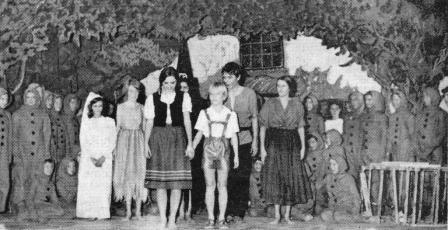 The full cast of Hansel
and Gretel
We were not without our gremlins. During the latter part of the term, Gretel went into hospital, Father had a leg in plaster, Mother took swollen glands, the producer was ill, and the second half of the orchestra (Miss Wakefield) dropped the lid of her piano on her fingers and spent several painful weeks in bandages! However the show went on and it was all right on the night. Indeed this proved to be one of the most satisfying, all-round efforts seen at Tal Handaq for some time.
School characters (1) Charities The school supports the Earl Haig Poppy Fund each year, and also the Malta Polio Fund. A collection of £14 15s. Od. was made for the former in the Autumn Term, and for the latter in the Summer Term. A number of 6th Form girls helped with the selling of flags for this fund. At Christmas £11 was sent to B.F.B.S. for the "Wireless For the Blind Fund", in return for air-time. Chris. Lawton did a Tal Handaq record request programme. The school also sent £10, at Easter, to "The Talking Book for the Blind Fund." This Fund provides recorded books, and tape recorders on loan from The Royal Malta Library in Valletta. One of the highlights of the year was the "Miles For Development Walk" organised by the Social Action Movement. This took place on November 15th and the entrants walked for twenty miles across Malta. Thirty two Tal Handaq pupils joined the walk, and we were the only school from which all those taking part covered the whole distance. The amount collected from sponsors was £153. 5s. 10d. We would like to thank those who have given either their time or money during the year.
School Dance The school dance, which was held on the 17th. December and had The Boys' in attendance, turned out to be a great success. But needless to say, it took an enormous amount of organisation from all departments of the school, which Debby Bradley and myself talked into helping. I would like to mention many for their help and hard work — Mr. Ward for printing the tickets, the Domestic Science teachers for the use of their rooms and advice about the quantity of food needed, Mr. Singleton for the use of his magnificently painted wood scenery for a background for the group and for the use of numerous materials for decorating the hall, Mr. Plant for the supply of minerals, Mr. Wright and Lieutenant Commander Butler for their advice in the organisation. There are so many pupils who helped, so I hope they forgive me for not mentioning them all by name. I would also like to thank Debby for her help in everything, Elaine, Cherry, Bev and Sarah who buttered countless slices of bread and stuck endless squares of cheese and pineapple on sticks; Adrian and his helpers who set up a lovely lighting arrangement with spotlights and numerous tinted lights; those who sold seemingly endless raffle tickets, enabling us to charge a minimum entrance fee and those who decorated the hall and made table decorations. After all this hard work put in by so many, it led to a successful and very enjoyable evening for everyone. CAROL TURLEY. School Characters (2) Annual Prize Giving 11th NOVEMBER 1970 If being first in the field is worthy of commendation then the annual prizegiving on Wednesday, 11th November, was a noteworthy occasion. For His Excellency Sir Duncan Watson, it was the first prizegiving at which he had officiated; it was also the first Headmaster's report given by Instructor Commander Law since taking up his appointment at Tal Handaq; and it was the first senior prize-day attended by Instructor Captain H. Brierley in his capacity as Officer-in-Charge of Schools. After the Flag Officer Malta, Rear Admiral D.G. Kent had welcomed the guests, the Senior Choir gave a rendering of "Linden Lea". This was then followed by the Headmaster's report. Headmaster's Report — Mr. Chairman, Your Excellency, Ladies and Gentlemen, May I begin by echoing Admiral Kent's words of welcome and adding the school's own very warm welcome to Sir Duncan and Lady Watson on this their first visit to Tal Handaq. We are also glad to welcome the Heads of Services: Admiral Kent himself, known rather quaintly as the school's Competent Authority, and Mrs. Kent, and Brigadier Ward. We are very sorry that Air Commodore Winn is prevented from being here by operational commitments but we are delighted that Mrs. Winn has been able to come. The Heads of Services are not only responsible for producing the parents who produce the majority of our children but they and their Services give us tremendous support and assistance for which we are extremely grateful. I should also like to welcome Captain and Mrs. Brierley on the occasion of Captain Brierley's first Prize Day as Officer in Charge Schools although they, like my wife and me, are no strangers to Tal Handaq Prize Days. And finally may I just as warmly welcome all our other guests, whether you are here by virtue of your office or your parenthood. We are delighted to see you all. It's a bit difficult for a new Headmaster to report on a year for which he wasn't mainly responsible, when any good things that happened were in spite of him not because of him, but the occasion does allow me to say certain things which, for one reason or another I shan't be able to say again. Tal Handaq is a very good school with a very high reputation. I can support the first of these statements from the report of Her Majesty's Inspectors who visited the school last Autumn and who said "Some teaching of distinction was observed" and "a significant number of the assistant staff are teachers of more than ordinary competence". They concluded that Tal Handaq is "a happy community in which good relationships flourish. The devotion of the Headmaster and staff to the personal and educational needs of the pupils who pass through it is evident and commendable". I can vouch for its reputation from the comments of parents, both those arriving who all seem to have had glowing reports of us, and those departing, many of whom are kind enough to make a particular point of thanking us for helping their children to make so much more progress than in any other school. These are, of course, tributes to a number of people, not least to my predecessor, Captain Malkin, whose dedication to and knowledge of the children in the school was tremendous in spite of the extra burden of his duties as Officer in Charge of all Service schools in Malta, Naples and Tripoli. I should like to couple a tribute to him with one to the equally dedicated staff which he handed over to me and I should like to take this opportunity of publicly thanking them for the support and encouragement they have given me in my early months. I am sure they will all understand if on this occasion I single out one name for special mention, that of Miss Yule. She has been teaching here for 21 years and has been senior mistress for 14 of them, and there can be no doubt that one of the main events of the school year was the recognition of her service by the award of an M.B.E. in the Birthday Honours list. We are tremendously proud of her and I for one cannot envisage how I am going to get on without her when she leaves at the end of the year, as it now seems she really will do, after our two reprieves. She is the one bit of continuity we have in an all-too-rapidly changing population. And lastly, of course, this reputation is a tribute to the children. You can't have a good school without good pupils and don't let anyone tell you there is anything wrong with Service children. The best are as good as you will find anywhere: the worst are ghastly, but I have to admit that other schools have more to put up with. But I must tell you something about the past year, beginning with what for us is the vital topic of numbers. Last year's numbers, surprisingly enough, were consistently higher than those of the year before, starting at 785 and remaining above 750 for most of the year. This year we began with 740 but since the departure of the 3rd Battalion the Parachute Regiment we are already down to 700. By all the rules, it looks as though, by early 1972 we shall be down to about 630, at which level we hope we may stabilize again. Seven years ago we were over 1,000. (Now you begin to see why we are down to a Commander on this job instead of a Captain!) But seriously, I must warn you that smaller numbers mean fewer staff and a possible consequent restriction on the subject options that we can offer, although we are doing all we can to keep any such restrictions to a minimum. So far there have been no changes in curriculum or in the general planning of the school, which remain as described last year. Coupled with numbers we need to look at examination results because, perhaps unfortunately, these tend to be what the academic standards of a school are judged by. Last summer we had 50 'A' level subject passes (from 30 candidates) in an academic sixth form with about 22 pupils in each of the two years. This was about the same number of passes as last year but from 12 fewer candidates. The quality of passes was not quite so good, as we had only two Grade A's and five B's. As far as we know four of those who left went on to Universities and four to Training Colleges. At 'O' level we must think in terms of a total fifth form strength of about 80, covering the whole ability range, equivalent to a grammar school fifth form of about 27, although we widen our 'O' level entry far beyond this. We had 263 subject passes in June (24 more than last year, but the number of candidates was higher too) and 53 in the preceding November. As you can see from your programmes 26 candidates achieved five or more subject passes in the year. We haven't listed their total scores. Some may have passed more subjects in the preceding year. In the C.S.E. examinations 88 candidates took 205 papers, only 11 papers being ungraded. Last year 43 out of 277 were ungraded so the success rate has improved, but we only achieved 16 Grade 1 passes (equivalent to 'O' level) compared with 25 last year. In summary, therefore, our exam results were up to standard in quantity but slightly down in quality, and I hope there are about 170 of you in front of me who are going to make quite sure that I don't say that again next year. Your aim must be to make your year the vintage year. No mention of examinations would be complete without a word of thanks to the Director of Education for Malta, Miss Mortimer, for the help given by her department in organising our GCE examinations. At the last minute Miss Mortimer was unfortunately prevented from coming today, but we are very glad to see Mr. Mangion, one of her Assistant Directors. There is a tremendous liaison between the Deputy Headmaster and the Registrar of Examinations, Mr. Attard (also here today), and we really are grateful for the load that is taken off our shoulders. Leaving the academic side I now turn to other activities, and I remind you that these are all admirably reported in the school Magazine where you can read about them in more detail. Copies are still available at the bargain price of 2s. 6d. each. Firstly sport. Smaller numbers, particularly in the upper part of the school, make it more difficult to maintain our traditionally high standards but we haven't done too badly. We have fielded school sides in most sports and they have done remarkably well in the face of what is often the formidably heavyweight opposition provided by the adult Service leagues in which we are forced to play. Rugby is a case in point and our last year's team was a strong one. Perhaps their best reward was the success of the A team in winning the Plate Competition in the Malta 7-a-side. These are times when fitness tells. Other sports in which we entered the inter-Service Leagues were Soccer, Basketball, Cricket and Ladies' Tennis. In Hockey the main event was the 6-a-side competition in which we entered no fewer than 6 girls' and two boys' teams. I can safely say it wouldn't have been the same without us. In Athletics and Cross Country the competition is almost entirely Maltese, and of a very high standard. Gone are the days when we could sweep all before us in these events, but perhaps this is just as well. Nevertheless our teams acquitted themselves well and the main successes were by the Under 15 team in winning their section of the Alpine Sports Club Cross Country League and the Senior side in winning the Malta National Under 19 Championship. In a small island, where opposition is hard to find, our own inter-house competitions assume greater significance and these were keenly contested in as many as 17 sports, a record number for us. The great majority of these games, at least in the major sports, are played on Saturday mornings and I am sure I am speaking for the boys and girls and their parents, as well as for myself when I say a big "thank you" to those dedicated members of staff who turn out on Saturday mornings to run these games. Strenuous activity is not confined to the games field and our Duke of Edinburgh work has also continued. A party went to Sicily in the Easter holidays and completed the necessary expedition work for 1 Gold and 3 Bronze awards. Sailing has also continued regularly and now that the Enterprise dinghies, so kindly lent by the Garrison Sailing Club, have finally got too long in the tooth, we are fortunate in haying been able to make use of Naval Bosun dinghies. We are grateful indeed to H.M.S. ST. ANGELO and to the Garrison and Naval Sailing Clubs for the help they give us with this activity and without which we could not carry it on, Other and less physically strenuous extra-mural activities have included those of the Literary and Debating Society, the very successful Christmas operatic productions of Menotti's "Amahl and the Night Visitors" and Gilbert and Sullivan's "Trial By Jury" and an excellent Fashion Show. Those of you who attended the Summer Open Day will have seen, besides examples of activities already mentioned samples of the very-high-standard work done by our Art, Craft, Domestic Science, Needlework, Metalwork, and Woodwork departments and you will not have been surprised to see on display the shield we won for being the school with the best performance at the 1969 National Exhibition of Children's Art in Malta. On the material side the main improvements during the past twelve months are the new car park, which many of you have used today, the new audio-visual room or cinema, which at long last, after some tribulations, is just about ready for use, and the extension to the Chemistry Lab, which was begun during the recent summer holidays and is now almost complete. But besides these more obvious projects the processes of modernisation, improvement and general maintenance go on the whole time and in this respect I really can't speak too highly of the work of M.P.B.W. and particularly of the always helpful, sympathetic and cooperative attitude of their staff under the leadership of the Depot Superintendent, Mr. Shepherd, whom we are particularly glad to see here to day. What difficulties there are, are certainly not of his making. I must also mention Mr. Depasquale, our Site Foreman, who gets asked to do just about everything under the sun, but never complains. Credit for the present generally excellent appearance of the school must be shared between them and the school's own industrial staff who, under the guidance of Mr. Hayman, the school Warden, maintain the gardens, roadways and buildings in an astonishingly high state of tidiness and cleanliness, sometimes I'm afraid, working against considerable odds. I hope a new Headmaster can be excused for being more interested in looking forward than back and I should therefore like to finish by saying a little about my hopes for and thoughts on the school. Having been here before, I was able to give some thought to this job before I arrived, but even I was astonished when I realised certain facts. At the end of last term I discovered that over half the pupils in the school were about to leave at the end of term, to be largely replaced by new ones this term. I checked again yesterday and I find we are already in the situation when 292 of our 700 pupils have arrived in the school since the beginning of September. About 3 in every 7. What can you do in such a situation? One thing you can't do is to launch forth into a lot of original and advanced educational schemes, because you will never be able to carry them through for any individual child. But there is a lot that we can do. Our aim is to prepare every pupil for the day he or she leaves us, whether to go to a job, a college or another school, and time is all top short, so we mustn't waste it. We must first, therefore, help the new pupil to settle down quickly and in this we all play our part, pupils and staff alike. New children are no objects of curiosity here but they are quickly accepted. One thing we take a pride in doing is adapting to the needs of the child who has been to innumerable schools — we had one in this term on, I think, her eighteenth. We must then get to know the children and their problems, remembering that with Service children some schools may not have had the time or the patience to do this before. We need to notice quickly if a child is in the wrong stream or following an unsuitable course. We need to be in good communication with parents, particularly the parents of those who don't seem inclined to work, because education is as much their job as ours and we need to do it together. To this end we are already planning more open days this year, so that we don't have to discuss the whole school on one afternoon. We need to provide even better and more continuous careers advice and to persuade children and parents of its importance. We have an invaluable annual visit from two U.K. Careers Advisory Officers, but parents seem curiously reluctant to meet them. We have an expanding school careers department but I am not convinced that it is used to the maximum. It is possible that parents and children don't like the advice they are given, namely that it is by no means to all young men and women over 16 that school still has something to offer. It is unfortunate that in Malta itself there is no alternative to school and we need to be at pains to explain this to parents before they come out here. Having nothing better to do is no good reason for staying at school, and those who do are probably missing irredeemable opportunities of joining industrial and other practical and vocational training schemes at home. Those who do stay here must be prepared to work; education is not something that they can soak up merely by being here and in Britain they will get no credit for an extra year at school unless they have something to show for it in the way of examination results at the end. Finally, when our student leaves to join another school he is sped on his way by a system which we have improved. It provides advice to the parents on effecting entry to a new school with a minimum of delay and a carefully written transfer report to enable the pupil to embark at once on the right curriculum. And what are our hopes for him when he leaves? We hope that he is a good ambassador for Tal Handaq, that he has developed some pride in his school. We hope that other schools will begin to notice the marks of Tal Handaq in those better manners, that pride in appearance, that enthusiasm which infects everything he does and that indefinable spirit with which he faces all difficulties. If these are the marks of Tal Handaq our reputation will grow even further, and good though it is in Service circles there is no doubt that at present insufficient is known about us, and indeed about all Service schools, outside these circles. You, the pupils and the parents, are the ones who can put this right. Our reputation is in your hands. After the Headmaster's report the Junior Choir sang two songs. The prizes were then presented by His Excellency Sir Duncan Watson the British High Commissioner. In his address Sir Duncan claimed that this was the first time he had been called upon to speak at a school prize day, and in vain he had tried to recall his own schooldays for some pertinent remarks. He referred to the way in which young people today were interested in changing the world, but he felt that it was wrong for them to strive to achieve a state of perfection which could not change --if everything was perfect, there could be nothing new each day. He referred to the vast changes taking place in education, with its new terminology that could be puzzling to the layman. The discovery that Latin was taught in streams evoked in his mind a picture of his former Latin master sitting on a rock in mid-stream, with himself in bathing trunks, construing Virgil. Sir Duncan concluded his address with the announcement of a future half day's holiday which was well received by those present. After a song, "Lift up Your Hearts", by the school, the ceremony was concluded, and tea was served for guests and parents. PRIZE LIST 1970 FORM PRIZES 1A1 Jeremy Brine Jon Hatcher Susan Smith 1A2 Margaret Driscoll Judith Housby Gail Smith 1B Sharon Archer Jane Ratcliffe Shayne Major 1C1 Rikky Milnes Howard Cave Deirdre Bannister Sheena Benjamin 1C2 Linda Eldridge Peter Swain Kenneth Sowden 1C3 Anthony Linford Rebecca Bennett Margaret Brumby 1C4 Teresa Burns Christina Darmody 2A1 Simon Cronin Deborah Glazer Paola Martinelli 2A2 Michael Clark Margaret Campbell Sharon Bickell 2B Denise Johnson Ian Springhall Jacqueline Edwards Rita Suett 2C1 David Phillips Susan Baxter Elizabeth Wyse 2C2 David Clark 2C3 Lesley Savory 2C4 David Wallum 3S Elizabeth Revell Anina Beaman Peter Hubbard 3T Gwen Hughes Boaz Keyslay 3U James Todd Ian Hall 3Q Susan Johnson David Pragnell Jacqueline Shimmin 3P Madelyn Lewis Annick Archer FOURTH YEAR Claire Barraclough Robert Broadway Rosalind Gary Lorna Cowburn Belinda Dunning Penelope Edwards Gordon Franks Janet Harvey Graham Longmire Colin Marsh Cynthia Mott Christopher Rogers FIFTH YEAR — 'O' LEVELS Michael Dennis Judith Fletcher Elaine Hoctor Marijke Mazure David Metcalfe Hazel Smith FIFTH YEAR — CSE James Jones Jane Powell Klaus Shore SIXTH GENERAL Sheryl Flatbush Susan Gray LOWER SIXTH Jane Stevenson Carol Turley SUBJECT PRIZES History: Cameron Beacom Maths.: David Norris Dominic Wujastyk Needlework: Judith Wallis Woodwork: David Brine Christopher Brine Eng. Drawing: Peter Walker Metal Work: Robert Elwell Art: David Coster Pottery: Thomas Fisher Malcolm Fox
HELP TO SCHOOL
Georgina Jeffries
Exam Results
GCE NOVEMBER 1970 ORDINARY LEVEL
PITMANS TYPING EXAMINATION The following passed at the elementary level MARCH 1970 HEATHER CAMPBELL ANN BROADWAY EVELYN SARGINSON THERESA SMITH JUNE 1970 PATRICIA GOODWIN SUSAN GRAY KAREN MILLER VALERIE REES YVONNE SMITH ELAINE STEWART PAULINE SUFFIELD JUDITH WALLIS GILLIAN ALLNUTT AT INTERMEDIATE LEVEL ELIZABETH BROWN THERESA SMITH PITMANS SHORTHAND EXAMINATION The following passed at the first speed MARCH 1970 LINDA BROWNLESS JUNE 1970 EVELYN SARGINSON CERTIFICATE OF PROFICIENCY IN THE USE OF ENGLISH MARCH 1970 DAVID NORRIS EVAN POTTS ROSEMARY ARDEN SUSAN DODSON PATRICIA LONGLAND JEAN MAIN JANE STEPHENSON SUSAN PEYTON JEANETTE SOUTHWOOD HELEN SPRINGHALL SUSAN WILLEY Poems and Essays
FIRE! The match ignited the paper. At first, the flickering flame seemed to die away, then it flared up. The burnt paper shrivelled and dropped, charred and blistered, into the waste-bin. The saffron flame writhed and twirled merrily. It danced across the paper, devouring it greedily. Then came the colours, glowing prettily, crimson, violet, blue and orange. Suddenly the flames began to crackle loudly, and they glowed even brighter than before. Then gradually they subsided into a blackened heap of remains, leaving only a spiral of smoke wavering in the air. Susan Perkins 1AJ GALLEY SLAVES The master called, the master roared, We'll have no slackening on board. So pull on hard, you so-called men, Or you'll be in the lions den. The swell was high, the sea was rough, And all the slaves, they'd had enough. The master was pushed o'er the side, To die beneath the foaming tide. Peter Campbell 1AF
HOW TO LOOK AFTER A BUDGIE A budgie is really a miniature parrot and very amusing, especially when he talks. Most budgies get to love their owners and enjoy having a fly around the house about four times a week. If you own a budgie you must know when and what to feed it on, how to clean its cage, and many other things. The first thing is to buy a budgie. You can get budgies in many different colours including blue and white, pure white, yellow, and other varieties. I find blue and white the best. The male birds have a purple or dark blue strip of skin above their beak. The females have the colour of their feathers, a female yellow budgie will have a strip of yellow skin above her beak. Never get two budgies, because if you want your budgie to talk and you have two birds, they will talk to each other in their own language and will not learn to speak. Always keep your bird's cage clean and healthy, and use sand-paper in the bottom of the cage to help to sharpen and trim their claws. Also put a bell and a mirror, and maybe a toybird in the cage to keep him company and a ladder for him to climb up and down on. A swing in the cage helps, for at night the bird likes to perch up high on something. Feed your bird on the seed that suits him best. To feed your bird fill up his dish in the morning, and at night blow away the empty husks, and fill up again. Water should be changed twice a day. Lisa Barlow 1AJ THROUGH THE EYES OF A MIDGET It appeared to be a huge opening, and the lower third of the opening was barricaded by a sort of oblong box attached to the sides. In the middle of the box was a space with what seemed to be a tray over the top of it. The tray formed a bridge across the space in the box. The whole thing was of a colossal size to me. Drawn by the sound of clinking glass and voices, I ventured through the space in the box, which seemed to be a counter. I gasped at what I saw. Two people were opening bottles and sorting them out. But they were not ordinary people, for to reach the peaks of their heads it would have taken about twenty-two of my doubles standing on each other's head. At the back of the opening, which was a room, were wooden shelves attached to the wall. On these were giant glass jars, which held colourful boulders wrapped in what I thought was transparent paper. One of the giants reached across, and taking one of the boulders, unwrapped it and ate it. Then she drank some liquid out of a bottle. Suddenly a bell sounded shrilly. In terror, I rushed out and took refuge behind a flower. I was to be glad I had fled, for more and more of those giants queued up in front of the opening. What was it ? The question echoed in my mind. (A description of Tal Handaq Tuck Shop) Susan Perkins 1AJ
LIFE AND DEATH (I think perhaps the main thing I would try to do in a nuclear war, in fact any war, would be to keep alive. 'Life and death' according to me, can be summed up in this short verse). Life is like a candle, A candle burning bright, But like a normal clock The life of man goes on, tic toe, tic toe Nothing can be changed, except from Day to night, The candle flickers out. And man is no more. The clock stops, No more tics and no more toes. The life of man is destroyed And perhaps the end of evolution. Karl Bacchus 3E AGE His hands were old and wrinkled, they hung motionless by his side. His fingers were thin and brittle and it seemed as though his every movement was like an eternity of pain. He hardly moved them now because they were weak and useless. His knuckles were large and smooth. The skin ebbed over them like a rough sea and his nails were white with age. Suddenly his hand stretched out and closed again as if he had clasped a handful of emptiness. His hands went limp, his mind went limp and then he was no more. Rita Suett 3E LOOK EVERYTHING IS WAKING ... Look everything is waking ... the traffic begins to roar. Lights flash on and off, babies cry and dogs howl. Smoke curls out of the chimneys like old men from their beds. Women in curlers run around the street looking for the late milkman. Doors slam and men go to work. Some drive noisy cars, other walk through the busy street. Machines dang and bang as they begin to wake from a cold night. Rita Suett 3E THE MINERS' RETURN Up the shafts they climb, Suddenly they appear, With faces covered in grime, And sweat. Their bodies look worn, Hands covered in blisters and cuts. Greeted warmly, they limp To collect their wages. With twinkling, yet sorrowful eyes They take them. Down the cobbled and dirty street, Over the hills, and into the valleys, All the time they dream, Of home, and bed. Sleep. At last they reach home, Greeted affectionately, by their wives. They climb up staircases, and hop into the bath. Their eyes close. Suddenly, they are awakened, It is morning. Back to the pits. Tony Hicks 4K THE ENGLISH GAME OF CRICKET In cricket you have two sides, one side in, the other side out. Each player from the side that's in goes out in turn until he is out then he comes in and the next player in goes out. Then when the side that were in are all out the side that were out go in leaving the other side out. This goes on until the side in is out and the game ends. However there are such things as not outs, but these just complicate matters. The final scores are totalled and the winning team is the side which scored the most runs while in before it was out. That describes the basic rules of the Simple English Game of Cricket. T, Robins 4L
Towards evening all cloud has cleared. Setting off alone in search of paths and peace, a tall wooden gate ahead obstructs the way and a kindly, fat female farmer offers a pod of broad beans in answer to an exaggerated face of lostness. The gate opens onto soft green seas of poppied grass, framed in low, friendly stone walls. But behind them, crouched men spring up on yet another netted, wretched sparrow. Moving on, then sitting in the midst of the tall grass to soothe your angry feelings the quiet bliss of a pale blue sky and the distant silhouette of an ancient beautiful cathedral. Nothing, nothing but this:— the tall grass and sky. But look again -Martians of television aerials crash down destroying the moment. Springing up irritably you walk on again and slowly calm returns, but soon the careless path betrays you onto the hard, black, noisy main road. A bus and two more scream by, kids and horn and flags harshly blaring "Vote Labour". And more men glare and stare from behind their relentless metal monsters whose noxious parting gestures drown and suffocate all scent of life. Ellie Hoctor LVI INFERIORITY COMPLEX Them Them Them Them Them Them Them Them Them Them Them Them Them Them Them Them Them Them Them Them Them Them Them Them Them Them Them Them Them Them Them Them Them Them Them Them Them Them Them Them Them Them Them Them Me. Chris Lawton L6 Arts
, 'WHERE THERE'S MUCK, THERE'S BRASS' I became a dustman for a very simple reason: I was broke. My 'demob' pay had gone, and there were four months to go before the University term — and my grant — was to start. So I found myself reporting for work one morning at half past seven to the local Council yard, little thinking then that I was destined to do this every summer — and sometimes Easter -- for the next four years! The foreman who had interviewed me a few days before had explained that his regular men were due to take their annual fortnight's holiday during the summer months — and I was to be their temporary replacement. This meant that I might be involved in any of the jobs in his department from 'Collection' to 'Disposal'. I began by working on the 'tip' under the kindly surveillance of an old coal-miner whose health had been impaired by long hours of working underground in conditions to which he was obviously not suited. Our job was to sort out the refuse after each lorry had deposited its load. We would wait for the dust to settle, and then like Hillary and Tensing we would climb from the bottom, collecting metal, bones, jam jars, rags or anything else that could be salvaged. All these articles were then to be stacked separately — later to be sold by the Council, who shared the profits with us in the form of a monthly 'Salvage Bonus'. I think it was in these first few weeks that I began to realise that I had not merely taken on a job, but was being educated in a way that no amount of study could ever provide. In this world of ours there are countless benefits which we take for granted. We never appreciate electricity until there is a power cut, or the internal combustion engine until our cars break down. We regard our dust bins in much the same way. Putting something into a dust bin is a final, irrevocable act — the end of the line. The result of this thinking is that things are put into dustbins with a gay abandon which is almost frightening, Students of Sociology ought, I am convinced, to do two months compulsory work on a refuse tip as part of their degree course. They would learn much about the people of the district. One of the drivers used to keep a tin of 'Brasso' in his cab, and did a very good line of trade with the local pawnshop, selling the brassware which we had found, and he had cleaned. Another driver mended old clocks. It was amazing to see how many articles were salvaged which people had obviously thrown out as 'junk'. At least there is nothing immoral in throwing out junk. But there is in tying a piece of cord round the neck of a ten day old baby and putting that in the dustbin. We made this awful discovery one wet and windy afternoon. The coroner's verdict was 'Murder by person or persons unknown'. So you see what I mean about people regarding the act of putting something in a dust bin as 'irrevocable'. In between the arrival of the lorries, old Bill and I would have a minute! Seated on a couple of upturned dustbins, our empire of refuse all around us, we would light our 'Woodbines' and wash the dust from our throats with long draughts of cold tea — made without milk or sugar. Bill would then, between bouts of coughing, entertain me with anecdotes about life down the mine, and I would sit at the feet of Gamaliel, listening to his common-sense philosophy of life. After completing my apprenticeship on the tip, I was transferred to the work of emptying the bins. I did a week with the 'light' gang, learning the 'Knack' of carrying the dustbins on a leather shoulder pad, and was then moved to the 'heavy' gang. The difference between the two gangs was this. The light gang emptied the dustbins of all private houses and 'better' residential areas in the district. One man went on ahead of the lorry with a special trolley on which he wheeled the dustbins on to the pavement. They could then be emptied by two men together. The 'heavy' gangs theatres of operations were the three estates of colliery houses. A coal-miner, even in summer, never uses a shovel to 'mend' his fire. He puts his coal on by the bucketful. Bigger fires more ash. He also sorts out his coal when it is delivered, and any lumps of bad coal — known locally as 'bats' - - he puts in the dust bin — irrevocably! This of course meant that the bins were heavier, and often hidden under a mound of ash. Each of these bins had to be carried by one man, as the trolley could not be used — but as we got a penny an hour more, we did not mind. We were the elite of the dustbin world -- and I particularly remember feeling flattered when on my return from the University the following summer the foreman sent me straight out with the 'heavies'. I think I realised then that I had arrived! My particular 'mate' on the heavy gang was an ex-Guardsman who had lost a lung in the Normandy campaign. For the first week he 'nursed' me, taking any bin that seemed by its weight to be glued to the ground. After that we took them as they came, and I soon learned how to duck under archways and open gates whilst carrying a bin and how to avoid trapping my fingers between the bin's handle and the steel side of the lorry when actually 'emptying'. My 'mate' was splendid company. He was very intelligent, and an excellent conversationalist and raconteur. Politics, literature, music — there was no limit to the subjects we discussed as we did our rounds — and the hours flew by in consequence. I'm happy to say that he has moved on to better things since. Rain, dogs and insects were our enemies. A dustbin left with its lid off in the rain for an hour becomes twice as heavy, and on being hoisted to the shoulder of the unfortunate dustman invariably treats him to a cold shower of a mixture of water, ash and tea leaves. As a red rag is to a bull, so is a dustman to a dog. They came in all shapes and sizes — from Alsatians that looked like Timber-wolves to yapping Pekinese — and they all seemed to have one common aim — the annihilation of the enemy — us. The 'gang' were experts at dealing with this menace. They knew every dog in the district, and could tell you each one's peculiarities and tactics. I remember going to collect a bin one day from a house with a large 'Beware of the Dog' sign on the gate. I was told by the gang that the dog was a Bull Terrier, but that as long as I advanced on him he would retreat. Under their critical eyes I walked down the path to be met by the dog. He retreated, certainly -- until I tried to pick up the bin. Then he advanced, with the hair sticking up at the back of his neck, and a sort of rumbling growl of patently enjoyable anticipation in his throat. He just stood with his head about a foot away from my hand — which had frozen to the bin handle — and waited for my next move. We remained like this for some time, whilst I made overtures such as 'Nice dog' - which he rejected with growls that obviously indicated that he was a 'Nasty dog', and took my words as adding insult to injury. I was saved by the timely arrival of the dog's coal-miner master, who heaved him bodily into a large Kennel-cum-cage in the yard, and consoled me with the words 'By gum, lad, it's a good job tha didn't move. 'E'd 'ave 'ad thy 'and off. 'E's a real lad, is yon'. I duly emptied the bin and returned to the gang, who had been watching the performance with great glee I only learned then that that was one bin that you never emptied alone. But most of the dogs were friendly enough. One old veteran, a battle scarred mongrel who looked rather like a Labrador chopped off at the knees, used to meet me every week as we came into 'his' street. He would take my hand in his mouth and trot along as I went down the garden paths to collect. Woe betide any other dog who barked at me then. One day I saw him lay a young puppy flat on its back and apparently worry it before it knew what had happened. The puppy had foolishly yapped at us as we came up the path. Now it was lying with blood all over its throat, and I thought the old mongrel had killed it. However, on closer inspection I found that he had just nipped the pup's ears, and they, as they flapped, had left what looked like a gory, fatal wound across its neck. It didn't yap the following week. Insects I have mentioned as our enemies. But on reflection I think we developed a kind of resistance to them, and were hardly aware of their presence. Wasps were there in abundance, but no-one was ever stung. Earwigs — known locally as 'Battlewigs' — seemed to have a particular liking to living inside the rims on the under-side of the bins — with the results that if a man was wearing an open-necked shirt one or two were bound to find their way inside it as he carried the bin on his shoulder. Every afternoon on my return home I had to go through a ritual 'de-lousing' ceremony. Without fail I would find a large number of earwigs — squashed or otherwise - - inside my shirt. Needless to say the ceremony took place in the garden — or in the toolshed if it rained. Of the many funny incidents which happened, one in particular has always remained clear in my mind. In one of the colliery villages the back gardens of the houses were very poorly cultivated, and there were no dividing hedges. The bins were always overflowing, and we invariably had to take a shovel with us to clear up the mess, refill the bin, and empty it for a second time. To make our task easier, after returning the empty bin we would take a short cut across the back garden to the house next door. I did this one morning in company with the foreman and my 'mate'. I was walking about a couple of yards ahead of them, and was just passing the back door of the house, when I was struck at the back of the neck by something hot and wet, which slid in sinister fashion down my neck. This sensation was followed by my being aware of the two who had followed me hooting with laughter, and the wife of the house standing on her back doorstep, cackling with glee. I had received at the back of my neck a bowlful of potato peelings which had been destined for the bin. As the bin was overflowing, the housewife had decided to save time by hurling them in its general direction, and I had intercepted them in orbit. 'I'm ever so sorry, duck (A local term of affection),' she said, between delighted chuckles; 'but then' - - trying to justify her actions — 'you ought to have used the front path you know'. The other occasion I remember that amused the gang was when the lorry ran over my foot. I was chatting to the driver, leaning on the door of his cab, when someone shouted 'Right' — which was the signal for him to move on to the next gate. Without thinking he let out the clutch, and the front wheel of the lorry rolled gently but firmly over my foot. I hopped _around in agony for a few minutes while the gang crowded round offering advice and trying to hide the laughter in their eyes by pretending to be concerned. Luckily I wasn't hurt seriously, and we pressed on, highly amused. After a time, as I have said, I became accepted by the gang as 'one of them'. Indeed there were people in the district who thought I was regular. But of course as Autumn came round I would return to the University for another year. I used to see the gang at Christmas and Easter, and they would ask me how the studying was going, and when the exams were due, and what they would do to me if I failed. When I got my degree, I turned up for work as usual at the beginning of the summer vacation. The gang were waiting for me with a special badge — they had found it in one of the bins — which they presented to me as a fully qualified dustman, and welcoming me to my year of postgraduate research into refuse collection. I think this was just to remind me that my new status pleased them, but hadn't altered their attitude towards me one iota. Soon after this the system was changed, and I was transferred to the 'Road gang'. I dug trenches, repaired roads, used the Pneumatic drill (a penny an hour extra), and, on one great day, drove the road roller. I say 'one day' purposely, because I broke all the kerbstones at the corner of one street, and the foreman would not accept my plea that they 'looked neater that way'. Then the summer after I broke away from my old employers, and yet somehow none of these jobs had the same appeal as working with the dustbin gang. In the September of that year it all came to an end. I started teaching — and my earnings dropped by three pounds a week. But that's another story !
SCHOOL SPORTS REPORTS RUGBY REPORT With only three players from last years team Mr. Jackson built up a reasonably competent side. Unfortunately the points wouldn't come, partly due to a great weight handicap in the scrum which resulted in a lack of possession. We were also very unlucky to lose our captain Dave Morris at the beginning of the season, when he damaged the cartilage in his knee. The end of the season came with the seven-a-sides. We got to the quarter finals of the plate competition losing to eventual winners H.M.S. LONDON 6-0 in a close and enjoyable game. Needless to say we all came away feeling very fed up that the season had ended. Results:— Played 10. Won 2. Drawn 0. Lost 8. Points for 46. Points against 143. Colours Bradberry, Davis. Half Colours J. Vincenti, Woodcock, Metcalfe, J. Lavin,
STANDING : Molden, McCole, Sarginson, Fraser, Linehan, Tillson, Burns,Peters, Vincenti P., Owens. SITTING: Rogers, Vincenti J., Lavin, Bradberry, Woodcock, Metcalfe, Gamble.
SCHOOL 1st XI REPORT (SOCCER) 1970-71 was a season which began disastrously but finished as one of the school's most successful ever. Before the Christmas Holidays, we had won only two and drawn one game (all friendlies), losing several times by high margins. However, our revival began with a 9-0 trouncing of the exiles, continued with a hard fought 3-3 draw with the R.M.P., and then with the team playing very good football we went on to register some excellent results. In particular those worth mentioning are a 5-1 win over R.N.W.T., and our last game of the season in which we defeated 'B' Company Devon and Dorset Regiment 7-0. In the Inter-Services six-a-side tournament, our 'A' team did extremely well to reach the semi-finals and it was only their own temperament which prevented them from progressing further. Nevertheless a tremendous performance. Congratulations to the staff in demonstrating their superior experience in the match against the school! Finally, on behalf of the team, I would like to thank Mr. J. Wright for his help and encouragement throughout the season. P 14 W 4 D 2 L 8 F 30 A 51 Pts 10. Peter Ward
BACK ROW. L to R: Keith Mariner, Bill Davis, Bruce Woodcock, Spence Berry, Peter Walker, Bob Gamble, Peter Toghill. FRONT ROW. L to R: Preston Peters, Howard Linehan, John Lavin, John Molden, Les Law, Nigel Vickery, George Molden.
COLTS U16 SOCCER TEAM
Maltese Schools League
1970/71 Lyceum Lost 6 -1 De La Salle Lost 5-0 St. Aloysius Lost 4-0 Technical Institute Lost 5 - 0 Naxxar Won 2 - 0 The Colts team was entered in the Maltese Schools League for the first time, and found themselves playing in a very high standard of football. Although they could often match the opposition with individual skills, the opposition were frequently much bigger than the Colts, and as a result, every match was a real struggle. Also, as the age limit imposed cut across two year groups at school, the Colts took a long time to get used to playing together as a team, and several changes, both in the players and their positions were necessary before a settled team could be found. KEYSLEY, the appointed captain, gave them an early lead in the first game, but unfortunately neither he nor the rest of the team managed to score again until the last game, when a season's hard work and enthusiasm was rewarded with a well-deserved 2 - 0 win over Naxxar. Throughout the season, although the results were a little disappointing, many individuals emerged with a great deal of credit. MARINER had a particularly fine season at centre-half, where his strength and reliability had much to do with keeping five scores just within the bounds of respectability. He was ably supported in his defensive role by LINEHAM, BIRD, MOYLE and ARMSTRONG. ROBINS in goal showed great courage against some strong opposition, until a dislocated thumb temporarily interrupted his career. WILKINSON deputised for the next few games and although somewhat unorthodox in his approach, still managed to stop considerably more than he let in. STANYARD in midfield emerged as the team's most consistent player, and played well in every game, the forwards were given very little room to move, and although the attack, spearheded by KELSLEY, BOWER and BONAS tried hard, they rarely managed to penetrate the opposition's defence. However, although the results were not as good as expected, the Colts gained invaluable experience both in their training, and tha actual games. It is hoped that this should lead to a much more successful season next year.
SCHOOL CROSS-COUNTRY REPORT On the whole, not our best season, although our Under 15's deserve credit for some very mature performances against stiff opposition. The winter programme opened as usual with the Alpine League Races, in which our Under 17's, due more to failure to field a full team than anything else, finished well down. The under 15 team compensated by winning their section after an exciting tussle with the Lyceum. In the M.A.A.A.'s Shuttle Road Relay race, both teams ran very well, with the seniors finshing fifth, and the Juniors one place higher, in their respective races. Our under 15's took the honours again in winning the
M.S.S.F. cross
in particular to
Donnelly (3rd In the M.A.A.A. National Championships, our Under 17 team came fifth, while the Juniors were just beaten for the first place. In the Annual School Inter-House Cross-Country Championships, Noonan won the Junior race in record time, Keysley the Colts, and Ward the senior race, Drake won the overall championships, thus ending the St. Vincent monopoly of the event. Lastly, I would like to thank Mr. Ricketts for his support and encouragement throughout the season. Peter Ward
SCHOOL ATHLETICS REPORT On the whole, not a very successful athletics season, with the standard of programme generally lower than last year. The first event of the year was the Malta Schools Championship, which we had won last year and hoped to retain. This was not to be, however, and with the Senior team finishing third and the Juniors fourth, we could manage only fourth place in the overall aggregate. Our results were rather more encouraging in the Malta Youths' Championships, held at the Marsa Stadium. We fielded only a small team, but everyone did well, in particular Gamble, Rogers and Downton, who between them collected three first places and two seconds. Our team also set up a new national record of 51.1 seconds in winning the 4 x 100m. relay. Finahy, I would like to extend thanks to Mr. Ricketts for his advice and encouragement throughout the season. Peter Ward
BACK ROW. L to R: K. Wortley, I. D'lvry, P.Ward, S. Downton, R.Thompson, I. Smith, D. Metcalfe. FRONT ROW: L to R: M. Smith, D.Noonan, T. Lambert, B. Keyslay, I. Metcalfe, M. Robins, M. Moyle. 56
NETBALL- SEASON 1970-71 Unfortunately, keeness amongst the girls far outweighed the opportunity for match play during the netball season. This is a great pity as there are some potentially very good players in the school who would enjoy and benefit by the chance to play netball teams from outside the school. We did however manage one or two matches, chiefly for the Senior Girls, one against the Malta Y.S.O. team and two against the local Qormi Secondary School. The First Years also had a few matches against the Service Junior Schools but obviously these matches were played very much with size and confidence in our favour. However they were enjoyed very much by the players concerned. The Middle School managed just one fixture against the Floriana Playing Fields Team. The best competition was in the house matches which were held during the Autumn Term. They were run in three age sections — Juniors (1st & 2nd Years) — Intermediates (3rd & 4th Years) and Seniors (5th & 6th Years). The teams were selected and coached chiefly by the Games Captains from each house with help from the House Mistresses. The Senior Girls are to be congratulated in the coaching of their Junior Teams. The matches were held on Wednesday evenings and were played with great keeness and competitive spirit. The results were as follows:— JUNIOR COMPETITION 1st — ST. VINCENT 2nd — NELSON 3rd — DRAKE 4th • - HAWKINS
SENIOR
COMPETITION
1st
— NELSON
2nd — DRAKE
3rd — ST. VINCENT
4th
— HAWKINS COMBINED CMAMPIONSHIP 1st — ST. VINCENT 2nd — NELSON 3rd — DRAKE 4th — HAWKINS
HOCKEY-SEASON 1970-71
In Hockey, outside matches were difficult to find, even more so than netball, as the Malta Schools do not seem to play at all. We did manage to have fixtures against the Wrens which were very good competition. We lost to them twice and managed to hold them to a draw the other time. We also had one fixture early in the year against a team from a visiting Dartmouth Training Squadron. Again the best and keenest competition was in the School House Matches held in the Spring Term at Corradino, when a lot of startling new talent was suddenly discovered ! This competition was held in two age groups — Seniors (4th, 5th & 6th Years) and Juniors (1st, 2nd & 3rd Years). The results were as follows:— Caroline Gary, Sally Arbuthnot, Theresa Smith, Ann Bacchus, Carol Turley, Debbie Wright. JUNIOR COMPETITION 1st — DRAKE 2nd — NELSON 3rd _ ST. VINCENT 4th — HAWKINS SENIOR COMPETITION 1st — NELSON 2nd — HAWKINS 3rd — DRAKE 4th — ST. VINCENT COMBINED CHAMPIONSHIP 1st — NELSON 2nd — DRAKE 3rd — HAWKINS 4th — ST. VINCENT At the end of the Easter Term we again entered for the Inter-Service 6-a-side Hockey Tournament. We entered four girls teams, two boys' teams, a Ladies' Staff team and a Men's Staff Team. All the teams played extremely well, sometimes against some quite tough opposition. Tal Handaq Girls II team, consisting of Ann Bacchus, Caroline Carey, Debbie Wright, Theresa Smith, Carol Turley, Sally Arbuthnot and Janet Griffiths, won their section to go through to the final which turned out to be against the Ladies' Staff Team. With experience on the side of the staff but maybe (dare I say it) age against them, the final turned out to be a close thing, resulting in a win for the staff by 2 goals to 1. Both the winners and Runners-up receiving individual cups at the presentation. M. Kearns GIRLS' BASKETBALL A small group of enthusiasts this year decided they wanted to form a Girls' Basketball Team. The enthusiasm was definitely there but to begin with, the basketball skill was a little dubious !! However the girls worked hard at this and, chiefly by their own efforts, managed to acquire some, if not all of the necessary skills and techniques. The only opponents we were able to find were the girls from the Polytechnic and this team we played five or six times. Although we were never able to beat them, towards the end of the season, we were definitely improving to the extent that we were rapidly closing the gap in the scores. Next year may see the break-through; the enthusiasts came from the following:— Ann Bacchus, Debbie Bradman, Maddy McKenzie, Sarah Braithwaite, Judy Fletcher, Rita Auger, Carol Turley, Jo Robinson, Chris. Henderson. M. Kearns
SCHOOL
SAILING
School sailing this year has differed from previous years, because of the merger of the Malta Army and Naval Sailing Clubs. Training is now carried out in 'Bosun' class dighies at Hay-Wharf. Several new people have been introduced to the Sport and should soon be qualified helmsmen. The actual instruction is carried out by people who are already qualified, under the watchful eye of Mr. Roberts and Mr. Tatton. Teaching people how to Sail is not easy and many helmsmen have learned much in self control. This year, school helmsmen have made up more than half the Malta Army dinghy team. Tal Handaq helmsmen have also taken most of the top places in Regattas. The school now has over twenty helmsmen, which makes it possible to hold an Inter-house sailing competition for the first time. This year we say goodbye and thank you to Mr. Tatton and Mr. Roberts who have devoted much of their time and skill to school sailing. Martin Donnelly CRICKET The team entered in the Naval League last season, was only a moderate team. The bowlers and first five batsmen were of a competitive standard, but they were let down by indifferent fielding. This year's six-a-side tournament showed that the school will have a good eleven man team, combined from the two six-a-side teams entered in the tournament. Full colours were awarded to John Molden, Terry McCole and half colours to Les Law, Spencer Berry and Mark Bradberry. Terry McCole TAL HANDAQ SENIOR JUDO CLUB
JUDO Tremendous progress has been made in the club, especially in contests, which resulted in many upgradings. In the forthcoming inter-house judo contest, competition should be fierce, as well as exhausting for participants. Although winners may only gain points for their house by a strangle hold, arm lock or throw, every one will gain valuable experience. The judo club now has KARATE sessions where the breaking of tiles, wood and the disarming of a foe are commonplace. On behalf of the club I should like to extend our thanks to our instructor Mr. Davies. Terry McCole D. Davies, Terry McCole, Steve Cotton, Larry Mogridge, Nick Roberts,Cameron Frazer, T. Ricketts.
BASKETBALL REPORT 1971 This year in Basketball, the school played well considering that the opponents were more experienced and we did quite well in winning two of our matches. All the players played quite well and have enjoyed the games very much. We would like to thank Mr. Ricketts for all the help he has given to us. We managed to join a league and have played friendly games one of which we won against Polytechnic. The main team consisted of Preston Peters, Scott Tillson, Larry Brid-well, Sean Hutchinson, Jeffrey Cornish, Ergu Biigin, Clay Owens and Peter Walker. Although we lost most matches, I think everyone played very well and hope that we will have some future successes. L. Bridwell (Capt).
Lyceum(
L) 20 -- 59 De La Salle
(L) 36 -- 68
St. Edwards
(L) 22 — 31 Friendly games. (a) Luxol (L) 28 - 45 (b) Polytechnic (L) 46 -- 56 (c) Polytechnic (L) 46 - 56 (d) Exiles (L) 32 -58 (W) 37 (e) Polytechnic (L) 32 - 44 HOUSE BASKETBALL Hawkins P3 L2 W11 Pts 2 Nelson P3 L0 W3 Pts 6 St Vincent P3 L2 W1 Pts 2 Drake P3 L2 W1 Pts 2
ORIENTEERING This year's inter-house competition over a reasonably taxing course of about 10 miles was essentially a test of route selection and map reading between fixed control points. The differing abilities of competitors in coping with the demands of the exercise are reflected in the time recorded for the first man home, 1 hour 40 minutes and that of the last man home, 3 hours 2 minutes. Good support running by Dick Mason (1st) 100 pts. and Peter Walker (2nd) 104 pts. ensured overall victory in the competition for Nelson. They were followed in closely by Peter Ward, M. Donnelly and T. Agius-Ferrante, all 3rd with 123pts. Final Home Positions: 1st Nelson 374 points
2nd St. Vincent and Drake 426
points HORSE RIDING The Combined Services Saddle Club is situated next to the Malta Mounted Police Stables, Racecourse Street, Marsa. Flight Lieutenant Bowen is the Stable Manager, and the Chief Pony Club Instructress is Mrs. Sheldon, who normally takes out the rides. The Saddle Club caters for Tal Handaq riders on Thursday and Friday afternoons. The Fourth year ride on a Thursday afternoon and the Fifth and Sixth years on a Friday afternoon. In all there are eighteen riders in the School, which is quite a good number considering that riding was started as a School sport only last September. It costs 107- to actually join the club, and £2 per month to ride once a week. There are twenty-two riding horses in the Stables, of which approximately eighteen are also used for Polo. We arrive at the Stables in time to help with the 'tacking-up'. This term means to put the saddles and bridles on the horses. The ride itself generally consists of walking and trotting around the race-track followed by about twenty minutes of basic schooling in the paddock. This helps us to maintain our balance and control the horse properly. The ride ends with a canter down the straight. Shortly we will be getting some jumping instruction. The height of the jumps has to be restricted because of the hardness of the ground. When we return to the Stables after the ride we are asked to 'untack' our horses, water them and put them into their respective boxes. If it is raining, or the ground is too wet for us to ride, Mrs. Sheldon gives us lectures on Stable Management, this includes such things as; mucking out the stable, cleaning tack, grooming, and learning about the different points (parts of the anatomy) of a horse. We are also told how to recognise common illnesses, for example Colic, and how to treat them until a Vet arrives, if necessary. On Sunday, June 6th, the Malta Horse Show will be held at the Marsa Although it is during the exams, it is hoped that some of us will be able to participate. Linda Sherwood Upper VI
Drake House Report (Boys) Housemaster: Mr. M. Roberts House Captain: Dominic Wujastyk Games Captain: Leslie Law This year has been one of enjoyment rather than fulfillment for Drake We have entered enthusiastic teams for all sporting events and in some cases this enthusiasm has met with success. Our greatest achievement was the resounding success we had in winning the interhouse cross-country championship. The senior team in particular gave a fine example of team running when our six runners returned amongst the first 14 home. The juniors and Colts had previously run well and laid the foundation for our success. The senior Rugby and Soccer sides were occasionally weakened at the beginning of the year due to lack of support. Those who did play, however, were all keen and gave a good account of themselves under the fine captaining of Les Law. It is good to see this Senior Soccer team play with quiet confidence without shouting and abusing each other. The Colts Rugby and Soccer teams led by Boaz Keyslay have acquitted themselves excellently taking second place in their section of the leagues. In the six-a-side competition the Colts won their section and helped the house to second overall position. The junior Soccer side, which has a large number of 1st year boys in it, played some excellent football and shows great promise. In Rugby too they have shown a lot of skill and although they lost two of their games it was by a very small margin in both games.
In the minor
Soccer league Drake finished above the other house
teams entered but were pipped for 1st place by a very good St. Andrews
team. Drake House Report (Girls) Drake has by no means been outstanding in any particular sport this year. The School year invariably starts off with a burst of enthusiasm from all sides and this year was no exception. We arranged Netball practices most weeks and we played the matches towards the end of the term. The results showed how worthwhile the practices were, regarding the juniors, as they came second but the seniors were not so' successful and overall Drake House came third. I think the goal shooters deserve a special mention because of their outstanding performance the junior shooters being Colleen Rea and Judith Housby and the seniors Sally Arbuthnot and Sue Dalton. The Hockey matches also, provided a good Saturday morning's entertainment end, despite the inevitable moan about having to get up on a Saturday morning, the House put up a splendid show. The juniors fought exceptionally hard and were placed first in their section. The seniors, however, were not so fortunate and only won one match. The final result was a draw between Nelson and Drake, but on goal average, Drake lost by a mere decimal of a goal. Our final position was second. We are still in the midst of the badminton matches and so far Drake has not been very successful. However, we hope to be more fortunate in the coming athletic and swimming sports. In general Drake girls have proved to be a very good house this year, and there has been no lack of enthusiasm and support. I should like to thank all those who did turn up to cheer the House during the various matches and also those who helped with the refreshments. These were financed from the Drake House Fund to which all (I trust!) contributed. The juniors were especially conscientious about this, and it was they who during the Christmas term made up from scraps of wool a blanket for the orphans. House literary competitions seem to be lacking this year, although it it hoped that they will be resumed during the next. In particular I should like to thank Miss Turner and also Miss Gallacher whose support, enthusiasm and encouragement have been unfailing. A special mention must also go to Caroline Fox, our Games Captain, end much of Drake's success can be attributed to her. Finally Caroline and I should like to say goodbye and wish the house every success in the future. Caroline Gary (House Captain) Caroline Fox (Games Captain) Hawkins House Report (Boys) I would like to begin by thanking Tim Patterson, my Games Captain for undimmed enthusiasm throughout the year. Also my thanks go to A.C. Frost, C. Donnelly, Scott Tilson and Bob Gamble for arranging teams etc. for inter-house games. Unfortunately, due to lack of response from the other houses, there have been no activities other than the standard games to report on. SENIOR RUGBY Hawkins had another successful season on the Rugby field. We were represented by six school players evenjy distributed between the forwards and backs. Davis was the "Shining Light" in the forwards and fully deserved his school colours at the end of season. Burns and Vincenti, our other school forwards, played with enthusiasm and consistency. Gamble, Woodcock, and Lavin made our back division the best in the school, and with strong, straight running posed many problems for the opposition. Callaghan also deserves mention for a fine season at scrum-half. In the seven-a-side, Hawkins distinguished themselves. Thanks to two tries by Lavin we moved into the final where Gamble, switched to scrum-half in the absence of Callaghan, scored three tries. Woodcock was undoubtedly our "player of the year" for his good work in defence and attack, and also his goal-kicking. R. Gamble COLTS RUGBY This year's Colts rugby team had a fair year but we could have done better. Everyone put a big effort into each game, but a few unlucky breaks doomed us. The game against St. Vincent, which was due to start at 10.15, started at 9.00, so we ended up playing three men short for the first part of the game. There was some excellent playing from Chris Donnelly and Carl Bacchus, third years who should prove a great asset to the Colts next year. Sean Hutchinson, Clay Owens, and Scott Tilson, Americans unfamiliar with the game, found it very exciting. In all, it was a team effort and everyone did his part. S. Tilson JUNIOR RUGBY Hawkins junior Rugby team had a very successful season without suffering one defeat. The first match was against St. Vincent whom we beat 9-0. The second match, against Nelson was won 22-3. Our final match decided the competition. After a good match against our opponents, Drake, we emerged the winners by 15-5. We also won our section in the seven-a-side tournament, again beating Drake in the final. The attendance was good and I would like to thank, on behalf of the housemaster, all the boys that participated. A.C. Frost SENIOR SOCCER Here Hawkins played with inconsistency. With a fair amount of talent in the side we were still unable to make an impression. With three school players in Gamble, Lavin and Woodcock, we should have done much better. Stanyard showed himself to be a skillful and consistent half-back and if the rest of the side had shown such attributes we would undoubtedly have done better. Congratulations to Burns for his brave efforts in goal. R. Gamble COLTS SOCCER The team this year was full of enthusiasm but, alas, did not have sufficient skill to make an impression. The team was unlucky in only obtaining one point for all its efforts. Two players who stood out in the matches were Tony Bobbins (goalkeeper) and David Theobald, the latter being our top goal scorer. Hoping for better things in the six-a-side, the team played with great vigour only to be narrowly beaten in both our games by one corner point. C. Donnelly JUNIOR SOCCER For Hawkins Junior football team, this season was not one of the happier ones, gaining only four points out of a possible twelve. This was due to the fact that the opposition was very strong. The four points however came with two wins over Drake. S. Fennel! CROSS COUNTRY in the inter-house cross-country we came fourth with 321 points. C. Donnelly, for the Colts, won a very hard fought second place in a time of 15 min. 15 sees. BASKET-BALL In the basket-ball championship, Hawkins won a well deserved second place. ORIENTEERING Hawkins' overall position in the orienteering was a disappointing fourth with 480 points. A special mention must go to Martin Donnelly who came third equal with 123 points. All but one completed the course. Adrian C. Worley (House Captain) Hawkins House Report (Girls) GENERAL REPORT At the beginning of the year, we welcomed Miss Wood as House Mistress. Since then she has helped the Hockey and Netball teams alike, encouraging players in senior and junior events. We were all very sad to say good-bye to Debby Bradley, formerly Games Captain. At the moment she is building up a basket-ball team in a school in the Canary Isles, whilst back at Tal Handaq Jo Robinson has taken over her job. I'd like to thank both Jo and Miss Wood for all their help, and the house for all their support throughout the year. Jane Stephenson GAMES REPORT The results of the inter-house team events were not as promising as the previous year; Hockey, after much hard work, brought us third in all, whereas we were first last year. In netball we came last - - (third last year), but although the Badminton tournament was not completed due to early exams., we were holding the highest score. Finally I'd like to thank all Hawkins house for their constant co-operation and enthusiasm all through the year. Jo Robinson Nelson House Report (Boys) JUNIORS This year Nelson Juniors enjoyed a moderate degree of success, coming second in all three of the main events. In football the Juniors won three, drew one, and lost two. The outstanding players being M. Boyd, S. Ginn, C. Riggs and B. Jones. In the cross-country, Nelson individually came first and second, with D. Noonan establishing a new record time of 15.32 minutes, closely followed by M. Robbins. The Rugby team won one, drew one and lost to the strong Hawkins team. In this, the best players were K. Jones and B. Kerry. D Noonan COLTS Nelson Colts, though small in stature, and small in numbers showed that skill is paramount when it comes to winning games! The only section lost was the Soccer six-a-side. The Rugby team played intelligently, keeping the game open and constantly feeding their three-quarters. Credit must go to the new boys John Anderson and Geoff Hart who played extremely well, and to Pete Southwick who was without a doubt Nelson's best player. We also won a seven-a-side with all members playing with spirit and determination. The Colts won the Soccer league in great style, dropping onlv one point in six games. Nelson played with an excellent team spirit, with Phil Chandler and Billy Griffiths playing well in every game and Robert Bower being the league's top scorer. Disaster struck the Colts in the six-a-side competition. Starting as firm favourites we soon lost our hold and finished a sorry third. The Cross-Country was snother triumph for the Nelson Colts. Credit for this must go to Mike Smith and Mike Rowlings who ran particularly well. A very good year for Nelson Colts mainly due to an excellent team spirit and a willingness to participate and enjoy their games. Thanks Everyone! Robert Bower SENIORS The Senior football team had a moderately successful season taking second place on goal average. The house was served well by P. Walker, P. Peters, H. Lineham and J. Molden (Captain). It was in the six-a-side competition where the seniors excelled themselves, disposing of the stronger all-round Drake team in the final. T. McCole proved himself to be a capable goalkeeper The Rugby team played well winning two games and drawing the other without conceding a point. Nelson had to be content with third place in the seven-a-side competition after a tough battle with Hawkins in the semi-finals. Nelson kept up its good record in Orienteering by winning this event for the third time. Most of the credit for this goes to Dick Mason whose skillful map reading and determined running earned his first place. Nelson came second over-all in the Cross-Country mainly due to the efforts of the Juniors and Colts. The Table-Tennis cup was retained by an exceptionally strong Nelson team, who only lost one game out of twenty-seven. The Basketball cup was won by a Nelson team who were strong in defence and quick in attack, and proved to be far superior to the opposition. SUMMARY An excellent effort by all members of the house has resulted in our winning half the cups so far presented and being firm favourites to win the Inter-House Competition Cup. In conclusion I wish to express my thanks to all who have worked so hard to bring about such a successful year for Nelson. In particular my thanks to John Molden our games Captain; his skill at various sports and his organisation of our Senior games has in no small way contributed to our leading position. To the House-Masters my thanks for their help and encouragement throughout the year. Pete Walker (House Captain) Nelson House Report (Girls) This year has been a highly successful one for Nelson girls. I would like to thank all those who have participated in house matches, support for house activities has been more than satisfactory. In particular I would like to thank Rita Auger our Games Captain. She has worked efficiently and her persistent efforts to rally support have not gone unrewarded. In the Netball Tournament, the Nelson team, won all their matches, with the exception of that against St. Vincent and their overall position was second. The hockey results were even more satisfactory. The Seniors won two of their matches and drew the third, whilst the Juniors won two and lost the third. The results were extremely close but Nelson managed to hold first position on goal average. The Athletics and Swimming events are to come. Support could be better for the Athletics and I hope this point is heeded by all Nelson girls, particularly the Fourth years. House activities this year have been centred around Sport. It is pleasing to note the contributions made from Nelson girls in school teams in Netball, Hockey and Basketball. Special notice should be given to those girls, particularly the Fourth years. House activities this year have been centred around Sport. It is pleasing to note the contribution made by Nelson girls, in school teams in Netball, Hockey and Basketball. Special notice should be given to those girls, particularly from the younger section of the House, who, in participating in outside activities such as the guides, have worked so hard in collecting for charities. Literary appreciation this year seems to have suffered but perhaps, nearer the end of term, some efforts will be made to rectify the situation. I would like to conclude by thanking Mrs. Harland, our housemistress, who has displayed keen interest and has given great encouragement in all House affairs throughout the year. As this is probably my last year at Tal Handaq I will take the opportunity to express my hopes that Nelson will continue to do well in the future and wish good luck to all its members. Ann Bacchus (House Captain) St. Vincent House Report (Boys) This has not been one of St. Vincent's better years, although I hasten to add that this has been due to no lack of effort or team spirit. SOCCER The inter-house competition proved to be our only major success of the year, and we won the overall championship, dropping only nine points out of thirty six. Our seniors in particular deserve credit for maintaining an unbeaten record in their six games. Barry, Molden, Vickery, Morgan and Ward all played for the school. We finished third in the six-a-side competition. RUGBY After completion of the programme of nine games, St. Vincent were firmly established at the foot of the table. Any hopes of the Seniors finishing in a high position, were ruined by injuries to Bradberry and Morris, while our Colts and Juniors suffered from lack of experience. Bradberry, Morris and Vincenti played for the First XV. We improved our position by one place in the 'sevens'. CROSS-COUNTRY A string of successive wins came to an abrupt halt this year, when St. Vincent gained only third place in the annual cross-country championships. This was despite taking the first three individual places in the Senior race, and courageous runs by Colts and Juniors. BASKETBALL I am sorry to say that we were unable to field our best side in any of the games, and as a result finished only third in the competition. In one match we took the field with only three men; a record speaking for itself! ORIENTEERING Tremendous enthusiasm was shown for this relatively new event, and we gained second place, equal with Drake. CONCLUSION As can be seen from the above results, St. Vincent have not been as successful as in previous years. However, with the Cricket, Athletics and Swimming sports still to come, there is plenty of time to make amends, and I am sure that we will. Finally, I would like to extend grateful thanks to Messrs Jackson, Davies, Smith, Kitson, and Bonner, for their untiring support throughout the year. Pete Ward (House Captain) St. Vincent House Report (Girls) House activities this year have been concerned mainly with sport. The teams were enthusiastic and they enjoyed participating in the various games which proved to be very successful in certain cases, especially the netball, and I hope this will continue in the future. This was not only due to the players themselves, but to the keen supporters who helped with refreshments and so special thanks to all concerned. I would like to thank Carol Turley, our Games Captain, who with constant enthusiasm organised the teams and helped them to success, and many thanks to Ann Broadway deputy Games Captain, and Julie Soar deputy House Captain for their help. Finally on behalf of St. Vincent, I would like to thank Mrs. McClure for her constant assistance and encouragement, which has helped the house considerably throughout the year. Sue Gray (House Captain) GAMES REPORT Owing to much enthusiasm and hard practising by all our Netball teams we were able to reach first place overall, with first in the Juniors and Middle school and a third in the Seniors, after many close and exciting games. So congratulations to all teams. Alas, our Hockey was not quite so successful, coming third after many hard fought games. The inter-house Badminton mixed doubles are not yet finished but we seem to stand a good chance of being well placed. In the future we are looking forward to and training for Sports Day and the Athletics. We also hope to have inter-house tennis matches in the foreseeable future. Lastly I would like to thank all St. Vincent girls for their constant enthusiasm, Sue Gray our House Captain for her continuous help during practices and also Mrs McClure for her encouragement and enthusiasm in organising the games. Carol Turley (Games Captain)
AIR SCOUTS (1st Luqa (Home) Malta G.C.) There are many scout groups in Malta, but the 1st Luqa Home Troop is the only Air-Scout troop on the island. Our Headquarters is stationed at R.A.F. Safi. We have been given some large huts for our scouting uses. We are supervised by four scout leaders, although we are going over to a new system of the Four Patrol Leaders running the troop. The four patrols are Nimrods, Lightnings, Jaguars and Phantoms, all of which are recognised aircraft. The meeting starts at roughly 6.00 p.m. and finishes at 8.00 p.m. on a Friday night. From the new system of the Patrol Leaders running the troop we are trying to extend the meeting a little longer so we can do more scoutings. UNIFORMS We of course have our own special uniform. It is not a strict uniform, only a pair of school trousers, a blue shirt with long sleeves, a green and gold neckerchief which can be obtained from the Scout Shop at Floriana and the Scout Headquarters at Safi. An R.A.F. blue beret is included or, if that is not possible, a navy blue beret from the Scout Shop (Floriana). Badges are provided when the person joins the scouting group. Black or brown shoes can be worn. The normal subscription asked for is 1/- a week, which is used for equipment, scouting aids, badges from the U.K. and camping equipment etc. There is also a tuck shop where soft drinks are sold. CAMPING The Patrol Leaders arrange many exciting camps, hikes and exhibitions etc. We have just finished a very exciting Easter Camp which Lightning won on points and were rewarded with a shield which records the annual Easter Camp winners. Our G.S.L. (Group Scout Leader) is trying to arrange a summer camp for us in Cyprus (1971). If we do not go to Cyprus we will definitely go to R.A.F. II Qortin on Gozo. We are sure that before this camp there will be many camps layed on for us. We have a number of tents and good camping ground. The troop welcomes any newcomers who wish to become a part of the world-wide brotherhood of scouting. Peter Terry 3F Michael Ingram 3E SCHOOL PHOTOGRAPHIC SOCIETY This year saw the revival of the Society which has been lying dormant for some months. It is now under the supervision of Mr. Getter. Membership is open to all years of the school and the members now range from the first to the fifth forms. The simple but fascinating processes of developing and printing are taught to all members and they are encouraged to undertake these processes themselves. The school's darkroom is not enormous but it is adequate and all of the equipment needed is provided. The society has not yet re-established itself completely but we are looking forward to next year when it should be thriving. A. Haley 4L BRIDGE CLUB REPORT A small but enthusiastic group of 5th and 6th Form pupils have recently been introduced to the intricasies of Rubber Bridge by Messrs. Jackson and Butler. Tuition and practice is given on Thursdays in the quiet of the Prefects Room after school and it is hoped that more pupils will accept the challenge of this great game when the club re-starts in the Autumn term. The only requirement is a knowledge of the mechanics of simple Whist, an enjoyment of card play, and a certain amount of low cunning ! THE ART CLUB The Art Club is usually held every Thursday after school in Room 27Q and is organised by Mr. Singleton. All sorts of materials are available and we can do any work we like. Sometimes we have models for life drawing but this is mainly for the 'O' and 'A' level candidates. Anyone may go along but they must remember to put their names down for the late bus. R. Riley 4L PAPERBACK CLUB A school Paperback Club has recently been established with the object of introducing pupils to a wide variety of cheap, yet good quality paperback books, many of which are difficult to obtain. Mystery Fiction, Animal Stories, Hobbies, Classics, Poetry, Humour, Quizzes, Sport, References, and Handbooks are among the various selections offered. Prices range from 3/- to 6/- and pupils may pay outright or by instalments if they wish; some prices are cheaper than ordinary retail prices. Each member receives a news sheet each month, giving details of the books available, and various competitions which are held; in addition, for every five books purchased pupils receive one free book. Books may also be purchased for parents, brothers and sisters if required. Any pupil is free to take part in the scheme, and there is no obligation to buy any book at all if you do not wish to do so. All pupils who are interested in this club are asked to consult Mr. A. Strong or any other member of the English Department, who will give further details. MUSIC CLUBS During the year the various musical activities have continued around the school. A recorder group was formed after Christmas, and now appears regularly at school Assembly. The senior and junior choirs appeared with some success at prize-day and have continued to meet during the term, although members of both seem to become rather absent-minded about regular attendance, especially when the weather is good. There is a small instrumental group which will have made its debut by the time this article appears. One of the most welcome innovations in school music has been the formation of a folk-club, under the general supervision of Mr. Bonner. Some very pleasing music has been forthcoming, including original songs by members. Several sixth formers led the singing of three songs by Sydney Carter at assembly just before Easter, and it was felt that this sort of thing could well be done more often, given suitable material. DUKE OF EDINBURGH During the course of the Autumn term seventeen young people expressed an interest in becoming candidates for the award scheme. Of these ten were girls and all in the fourth forms. With one exception all candidates are entering the scheme at Bronze level. There has been some difficulty in making arrangements for suitable courses to be established for candidates but most are now occupied in following activities in one or two sections of the scheme. It is planned to carry out the expedition training and the expedition itself during the course of the current term. It should be emphasized that success in the scheme depends very largely on the initiative, enthusiasm and interest of the candidates themselves. Several members of staff are fully prepared to give help and advice where required but the "drive" must come from you — you who have entered the scheme. FOLK CLUB The folk club started at the beginning of the Spring Term, and after an unsteady start began to get regular support mainly from the junior forms in the school. It was helped during the first few weeks by some stirring performances from Dominic Wujastyk, Mark Bradberry and Janet Harvey, whose efforts prompted other members of the club to come forward and do what proved to be some excellent performances. Particular mention should be made of two separate groups of second form girls. The first group performed two of their own compositions, which were really of a very high standard and the second group produced some excellent arrangements of popular folk-songs. We would welcome any new members next session, particularly those who are willing to add their vocal or instrumental talents to those already in the school. OLD PUPILS PAGE Unfortunately there are many former pupils who leave Tal Handaq and are never heard of again. This however is counteracted by the fact that many who have left a considerable time ago continue to give us news of themselves. Martin Fuller who gained a "First" at Exeter last year has been accepted by the Administrative Branch of the Civil Service. With the increase of University places during the last decade there are quite a few former pupils reading for degrees at various Universities and Colleges of Education. Manchester appears to be a popular choice. Christopher Stevens and Peter Ross are in their final year there; David Radford in his second year - - his wife (Josephine Mogridge) is at a nearby College of Education - - Evan Potts is in his first year, reading Business Studies. At Leeds, Linda Wigglesworth, after gaining three Grade A's at A level is reading Modern Languages -- also there, is Martin Powell who is following a Business Course. Wendy Coupe is in her third year at Homerton College of Education and has been accepted by Newnham College to take a degree in Chemistry and Education - - Her sister Christine is working for A levels at Sut-ton High School. Cameron Beason is in his first year at Southampton, while Linda Oiver has started at Swansea. At Colleges of Education are Rosemary Arden, in her first year at Roehampton, Janet Baker in her last year at St. Osyth's College of Education, Clacton, Lynn Edmonds has finished her course at Bretton Hall and now married (Mrs. Stuart Reeves) and is teaching. Bill Duncan who qualified at the same college is in his second year at an all boys school in Bermuda which he enjoys very much. He had previously taught at Wakefield Grammar for a couple of years. He combines his teaching job with that of organist at the parish church. Pamela Gard, whose mother was for some time the school secretary, has been teaching Maths in a boys' school but is now on supply in the Bristol area as she intended to get married this spring. Ewart Shaw is in Australia, he hopes to enter a University there. Felicity Burge and Christopher McReady were married in July 1970 - they first met in the VI form. Felicity works with the B.B.C. on the Open University project and Christopher is an account executive with Bruning's Advertising. Angela Salter (Gallop) has moved to Northamptonshire, she now has two small sons. One of her contemporaries, Pamela Hinton has a six months' old little girl and Paula Goodale (Gilbert) has just had a son. Rosemary Andrews is working in an hotel in St. Albans and is really enjoying her job, she tried several careers before finding the right one. She is near Rosemary Dearden who is teaching Geography in the Grammar School at Tring so they meet frequently and I am sure their Tal Handaq days are often discussed. Linda Perry, after a year in a bank, has changed her job to the Southern Gas Board where she is working with their conversion to Natural Gas. She gave news of Heather Coggeshall who is now working as a Shorthand-Typist for an Electrical firm in Fareham. Susan Dodson is a management-trainee with Marks and Spencer. Malcolm Aldworth is studying surveying and his brother Roy is doing a three year course at Southampton Technical College in Boat Building. Some of our American pupils have sent us news — Debby Bradley is at the American school at Las Palmas and returns to Texas in the Summer to start a University course in September. Patricia Goodwin is doing a nursing course at the University of New Mexico. Richard Ball is now in the United States Navy. Michael Jones has joined the Police Force and Jane Savage is a Policewoman with the Cardiff Force — she thoroughly enjoyed the strenuous training course. Allison Bigden, Patricia Longland and Rosemary Fisher are all doing Secretarial work in London. Helen Springhall called at Tal Handaq recently — she is working with I.C.I, near Reading. Karin Parkin has been working with her step-father's firm in Holland but hopes to return to Malta if she can find a suitable post. Both Claire and Nicola Barraclough have settled happily into their new schools at Farnham and Christine Wilkinson is at Guthlaxton Upper School, Leicester where, in spite of there being only 4th, 5th and 6th forms, there are forty prefects. This is only a cross-section of the many activities and courses which our ex-pupils are doing but there is, in all their letters, a real affection and feeling of nostalgia for their days at Tal Handaq which is evidence that The Services Secondary School is not such a bad place after all.
FROM THE EDITORS The Magazine Committee would like to thank all those who have assisted, often at short notice, with the production of this magazine, and in particular to Miss MacKay, Mrs. Ellul and Theresa Smith who typed the copy. Our gratitude is also due to our advertisers without whose financial aid there would be no magazine -- please support the advertisers and mention the Magazine if you can. The cover photograph is by courtesy of Photographic section H.M.S. ARK ROYAL, those of Hansel and Gretel by courtesy of the Admiralty Constabulary Photographic Section and those of the Cross Country races by courtesy of Father Hessery. Finally may we add that if any members of the school find fault with the magazine — and we are sure there are many faults to be found -then the solution lies in their hands; contribute to the next year's edition and make it a better one. PREFECTS 1970/1971 School Characters (4) HEAD BOY DEPUTY HEAD BOY Mark Bradberry David Morris PREFECTS Peter Ward Peter Walker Tim McCole Dominic Wujastyk David Kingdon SUB PREFECTS Martin Donnelly Richard Mason John Harrison John Molden Timothy Patterson Joseph Vincenti Tony Sarginson Chris. Lawton Adrian Worley Robert Etwell Paul Gilroy James Jones HEAD GIRL DEPUTY HEAD GIRL
Jane
Stephenson
Ann Bacchus PREFECTS: Caroline Fox Caroline Gary Gillian Allnut Julia Hann SUB PREFECTS: Ann Broadway Diane Lawrence Valerie Rees Jean Stewart Sue Gray Diane Cornish Rita Auger Caroline Malinowska Adria Rosser Linda Sherwood Annette Harrison Theresa Smith
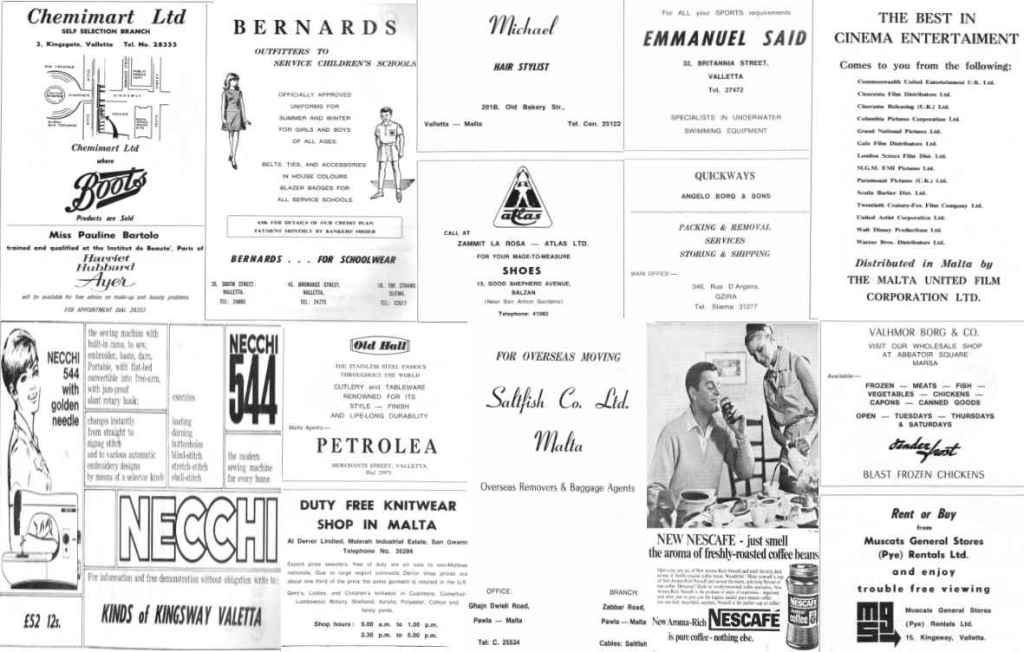 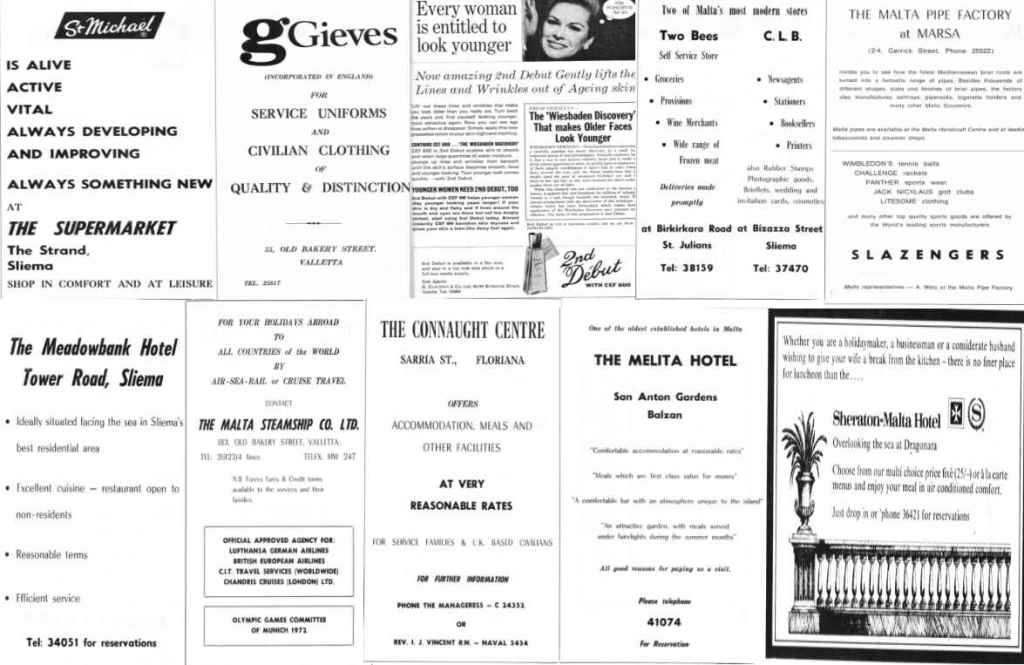 Back to Top Suggestions for suitable music for this page are welcome. Email the Webmaster. |
